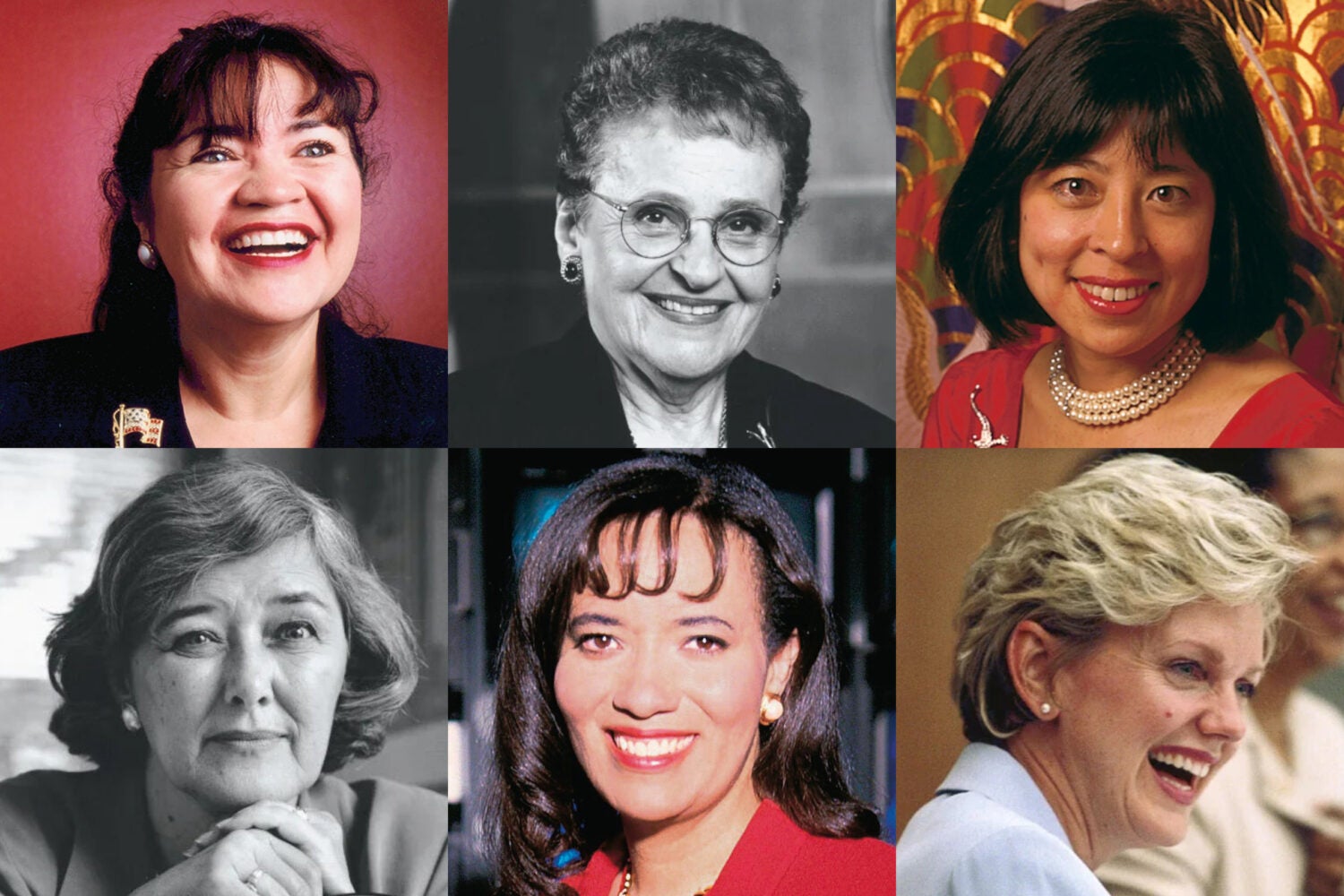There’s nothing noteworthy about being a female student at Harvard Law School today: About half of the students are women. Of course, that wasn’t always the case. Indeed, because of the gender disparity of the past, fewer than one out of five living HLS alumni are women. But they are remarkable in ways far disproportionate to their number. The 7,200 alumnae have sought justice, tried cases, drafted legislation, built businesses and taught attorneys-to-be. In honor of Celebration 50, we highlight 50 of the many alumnae who have used their HLS education to take them to extraordinary places.
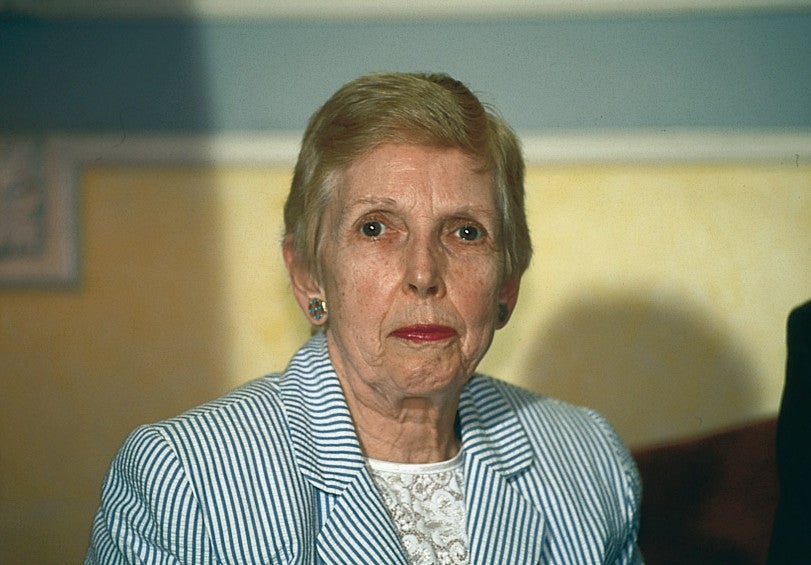
It wasn’t easy for the first women students at Harvard Law School. But in a way, the women of that era were accustomed to that, said Charlotte Armstrong ’53. “It was a totally male world, but that was the world we grew up in,” she said during Celebration 45. Indeed, despite the difficulties of the experience, Armstrong became one of HLS’s and Harvard University’s (she graduated from Radcliffe in 1949) most loyal and active alumni. A former president of the Harvard University Board of Overseers, Armstrong also served as president of the Harvard Law School Association, the second woman to hold that post, and vice president of the Harvard Club of New York City. In her professional career, she worked as a litigator with the U.S. Department of Justice and in employee compensation and benefits in the private sector. When she was a student, Armstrong said, she never realized the importance of breaking the gender barrier at HLS: “You just put one foot in front of another, and then it turns out that you are a trailblazer.”
* * *
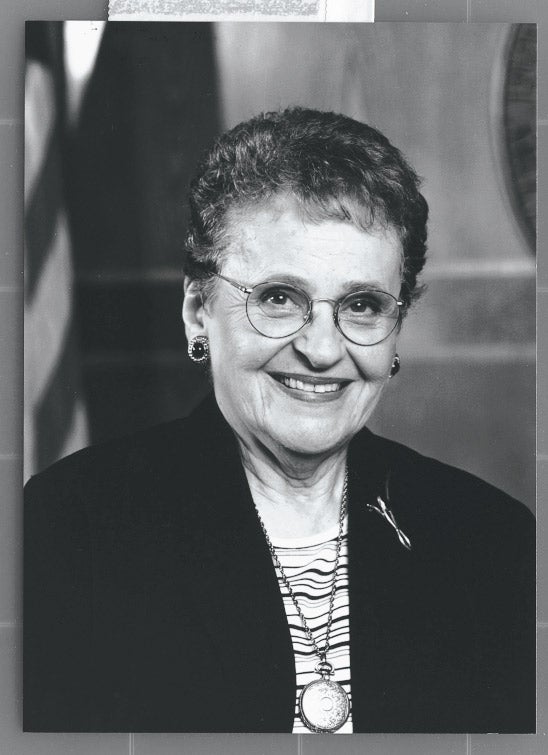
Frederica Brenneman ’53 will forever be identified with the TV show that in part portrays her life on the bench. Some may see that as a simplification of a longtime career in juvenile court. But she sees it as an opportunity.
For Brenneman, the CBS series “Judging Amy,” starring her daughter Amy Brenneman, educates the public about “the enormous importance and complexities that are confronted daily by those of us whose professional lives are devoted to improving the lives of neglected and abused children,” she said. Appointed a Connecticut juvenile court judge in 1967 (only the second woman in Connecticut judicial history at the time), Brenneman has been a passionate advocate for improving conditions in the juvenile justice system, promoting the principle “First, do no harm” in the name of child protection. In addition to her judicial work, she has been active in training judges, social workers, lawyers and others to respond to child abuse. She has also served as an adviser for her daughter’s show and is a passionate advocate there too, ensuring that the issues she cares about reach millions every week.
* * *
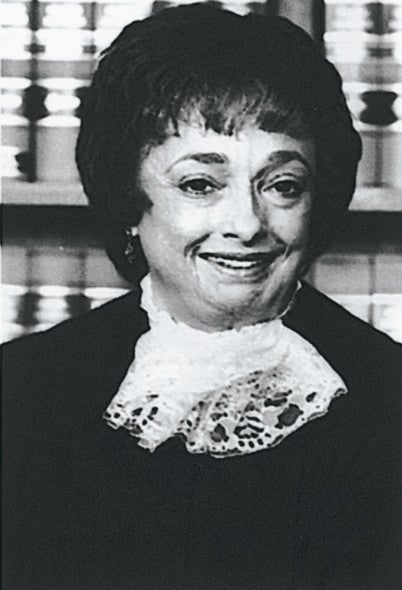
The Massachusetts Supreme Judicial Court is the oldest continually operating court in the Western Hemisphere, a functioning body since 1692. But it took nearly 300 years before the court included its first female justice. That was Ruth Abrams ’56, a woman accustomed to breaking barriers as a member of one of the first classes at HLS to include women.
Abrams, appointed to the court in 1977 by Massachusetts Gov. Michael Dukakis ’60, retired in 2000 after a judicial career in which she was known as a supporter of gender equity and minority rights. “Many of the opinions I wrote sort of put out a helping hand to people who find themselves in situations that are not right for them,” she said in 2001.
Formerly an assistant district attorney, division chief in the Massachusetts attorney general’s office and superior court judge, Abrams “devoted her entire life to law and the legal system through public service,” HLS Professor Arthur Miller ’58 told the Associated Press. “I have never really met anyone more dedicated to her job and to doing it right than Ruth.”
Abrams hopes that it is easier for women lawyers to become judges today, she said. Thanks in part to her efforts, it is.
* * *
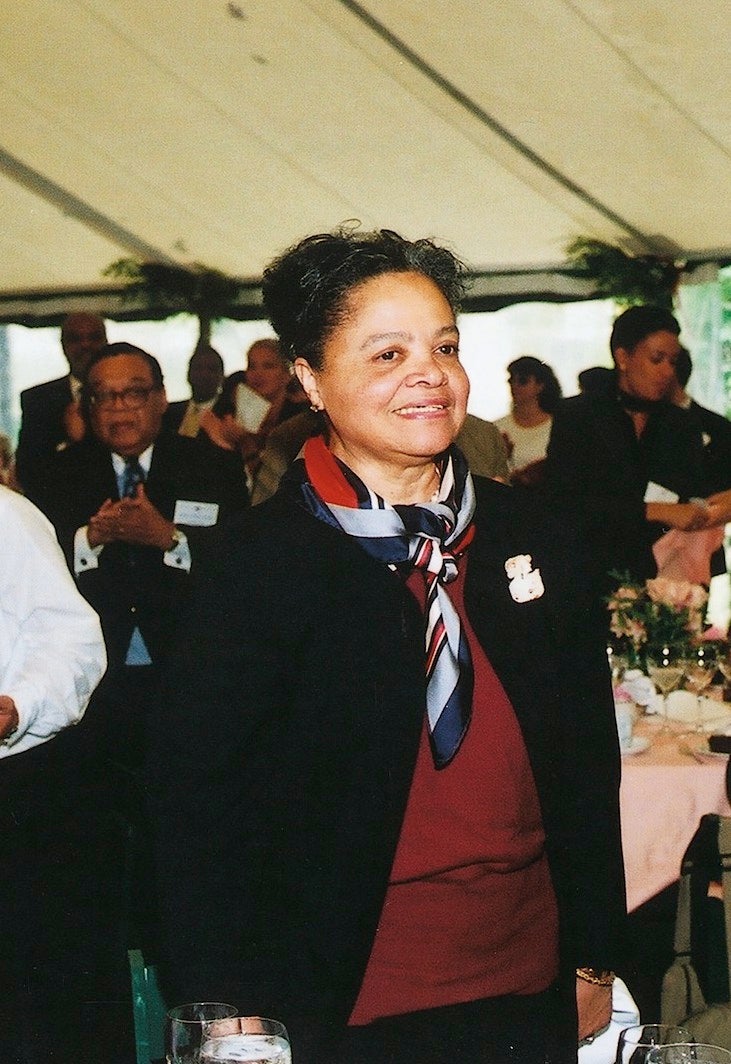
George Lewis Ruffin 1869, who was Massachusetts’ first African-American judge, became the law school’s first African-American student shortly after the Civil War ended. During the era in which Thurgood Marshall argued against “separate but equal” in Brown v. Board of Education, HLS accepted its first female African-American student.
Lila Fenwick ’56 remembers the day the Supreme Court decision came down in 1954. “I was delirious,” she said in an interview during the September 2000 Celebration of Black Alumni. At the time, she lived in housing reserved for black students. Later, she would walk among world leaders as chief of the human rights division of the United Nations. She never doubted that she would achieve professional success, despite the racism she grew up with and the sexism she encountered in school and beyond. “I knew I was going to be a lawyer when I was a little girl,” she said. “It never occurred to me that there were going to be any obstacles.” With that determination, she has helped tear down obstacles for generations of students at HLS.
* * *
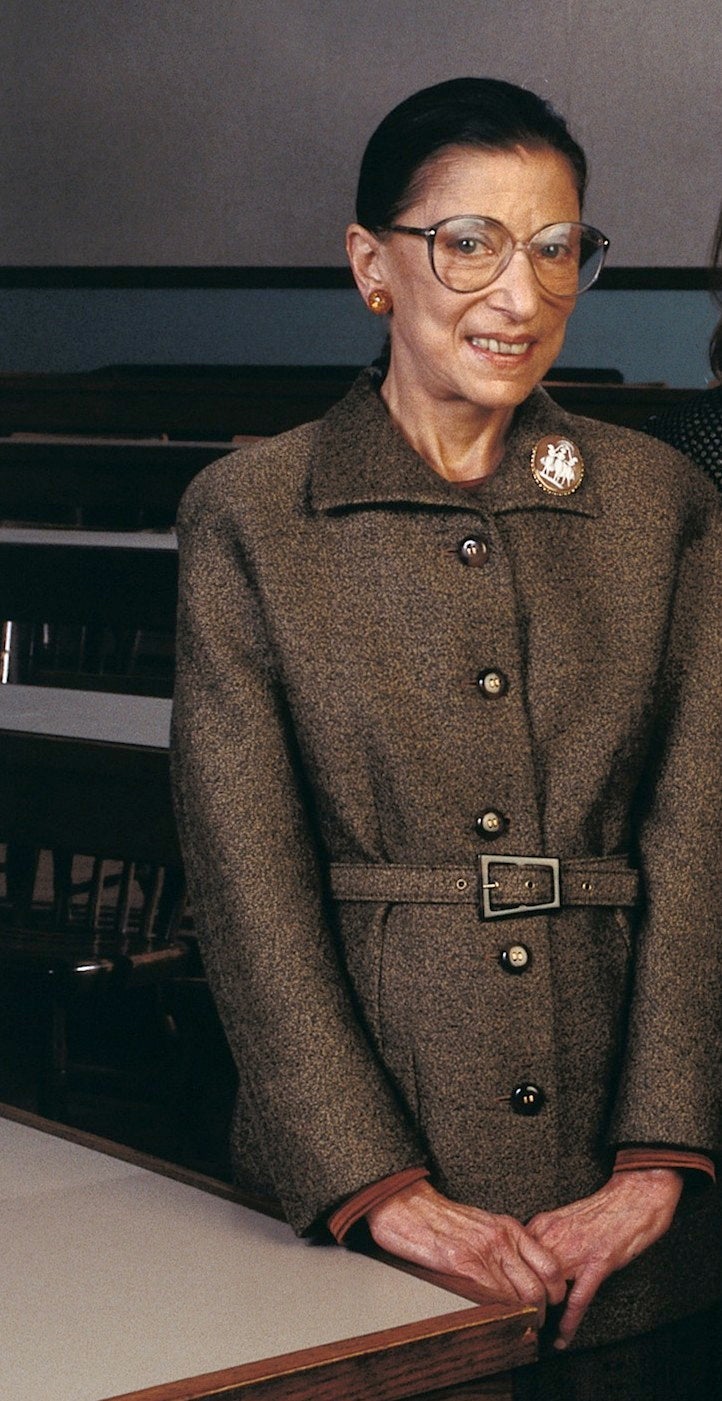
Long before anyone could have imagined her in her current job, Ruth Bader Ginsburg ’56-’58 got some advice: “My mother told me to be a lady,” she said. “And for her, that meant be your own person, be independent.”
The second female justice on the U.S. Supreme Court, Ginsburg has long exerted her independence as a powerful voice on the Court and, previously, as an appeals court judge, practicing attorney and law professor. From the beginning of her career, she advocated for women’s causes, eventually arguing six cases on sex discrimination before the Supreme Court. She was the first female tenured professor at Columbia Law School, where she obtained her law degree, and the first director of the ACLU’s Women’s Rights Project. After Ginsburg served as a judge on the U.S. Court of Appeals in the D.C. Circuit, President Clinton nominated her for a seat on the Supreme Court in 1993. Known as a liberal on the Court, she nevertheless has pleased–and angered–both sides of the aisle with her opinions and is one of the most publicly outspoken of the justices. Her mother would be proud.
* * *
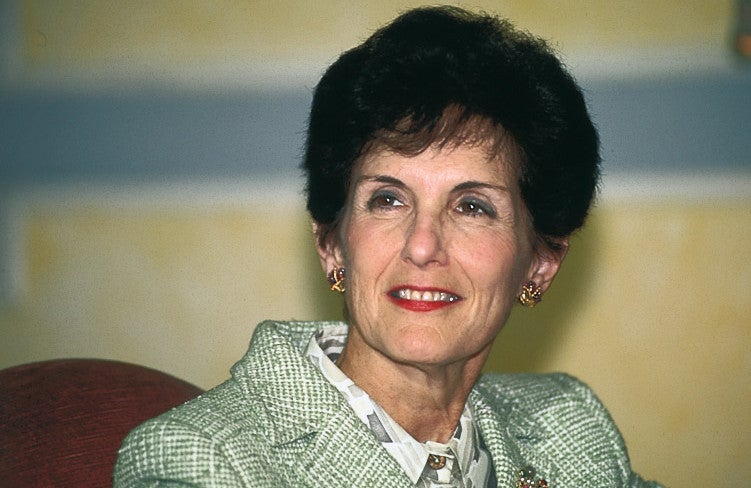
People at Harvard Law School say her name every day. That’s because her name, along with her husband’s, Gustave ’53, is attached to HLS’s newest campus building, Hauser Hall. But while the donation for the building was considerable–$13 million during the law school’s previous fund-raising campaign–it’s just one of many contributions Rita Hauser ’58 has made, both in philanthropy and in international politics.
Most recently appointed to the President’s Foreign Intelligence Advisory Board for the Bush administration, Hauser has focused on international legal matters since being named the first woman partner of Stroock & Stroock & Lavan in New York City. She served as the U.S. representative to the U.N. Commission on Human Rights, was an adviser to President Nixon, and met with Yasser Arafat and helped persuade him to renounce terrorism publicly and recognize Israel. As president of the Hauser Foundation today, she contributes widely to academic institutions and other causes, something she urges more women to do. Philanthropy, like everything else, is not just for men anymore.
* * *
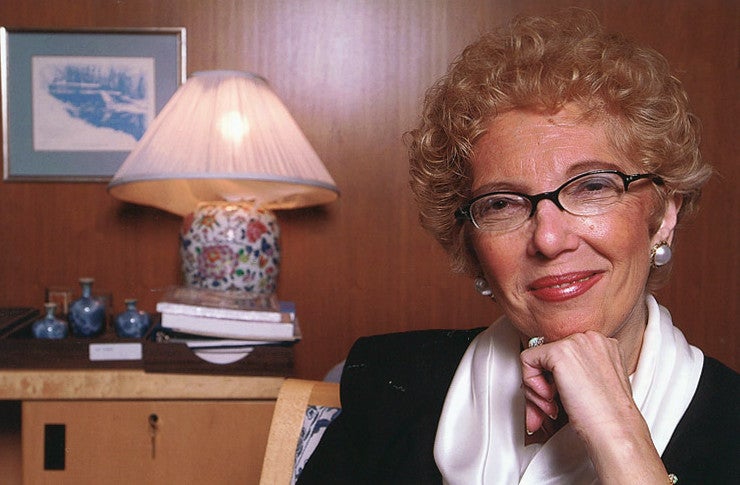
Gladys Kessler ’62 is part of a quiet revolution. As she noted 10 years ago during Celebration 40, women on the bench have changed societal expectations on issues such as child support, domestic violence, gender bias and access to justice. Their very presence in the judiciary, she said, has helped the system acknowledge the realities of women’s lives.
Appointed to the U.S. District Court for the District of Columbia in July 1994, Kessler was part of the first wave of women to attain seats on the bench when she became an associate judge of the Superior Court of the District of Columbia in 1977. “Every single one of Judge Kessler’s accomplishments [was] at the time groundbreaking,” Judith Lichtman, president of the National Partnership for Women and Families, told The Boston Globe last year.
Many of her cases are notable as well, including the government’s suit to recover damages from tobacco companies, which she is scheduled to preside over next year. She also ordered the Justice Department to disclose the names of those detained after the Sept. 11 attacks.
Twenty years ago, Kessler said that women “have a responsibility to make a difference in the legal system and the administration of justice.” She still takes those words seriously.
* * *
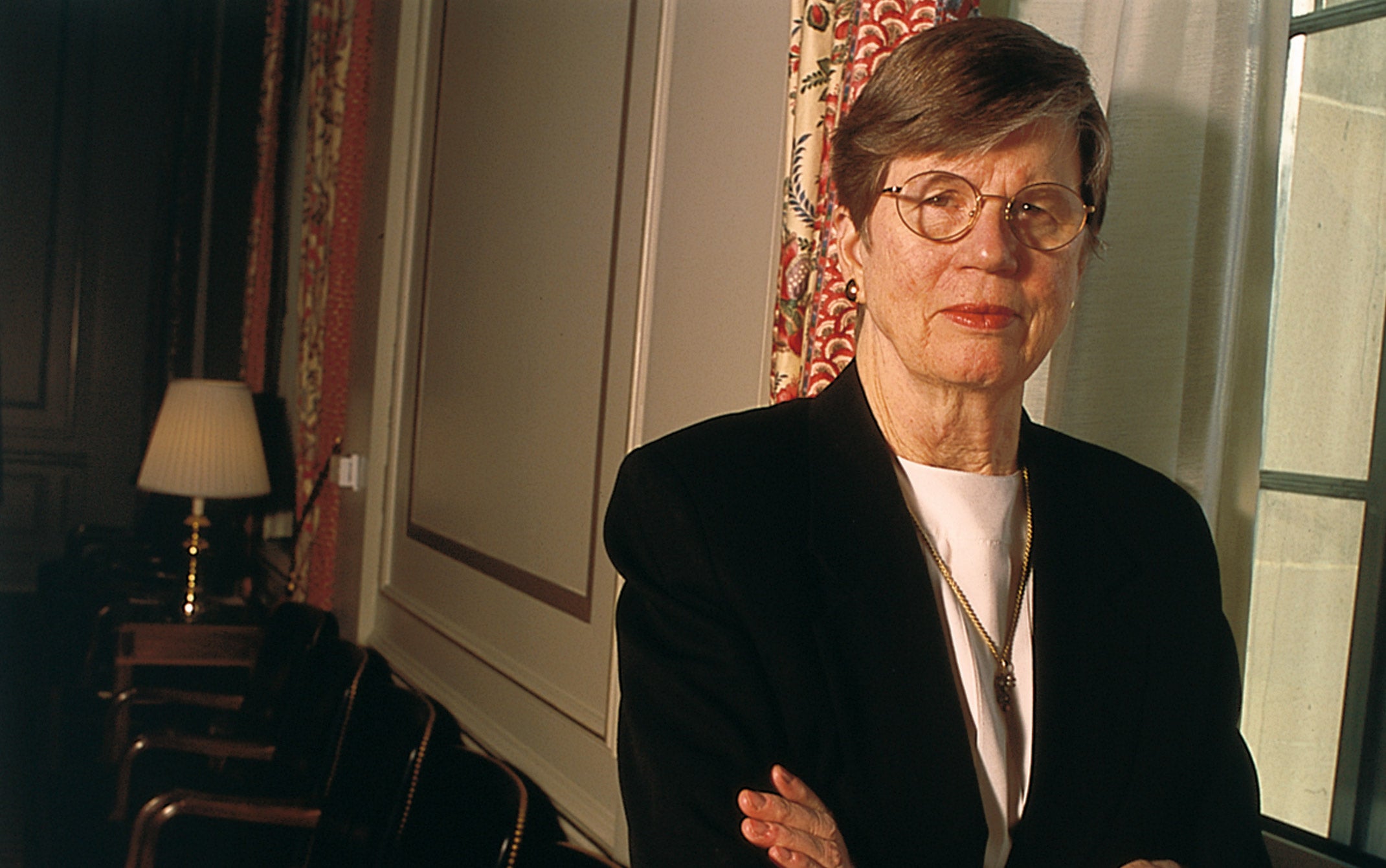
She is the most famous HLS alumna. The first female attorney general of the United States, Janet Reno ’63 was a flash point for praise and outrage over the many contentious decisions of her tenure, which was the longest of any AG in the 20th century. “I was damned if I did, and damned if I didn’t, and I was going to get criticized,” she said in an interview with the Bulletin in December 2000. But beyond controversies like Waco and Elian Gonzalez, Reno emphasized reforming the criminal justice system, as she did when she instituted drug courts as state attorney for Dade County, Fla., and providing education and health care to children to stem violence in society. She also preached the need to serve the public. That’s why she ran for office last year, for governor of Florida, after returning to her home state from Washington, D.C. She lost, but, as she told an audience when she accepted an award at HLS, “If people won’t run for political office because they think it’s beneath them, then democracy is at risk in this world.” No one would criticize her for saying that.
* * *
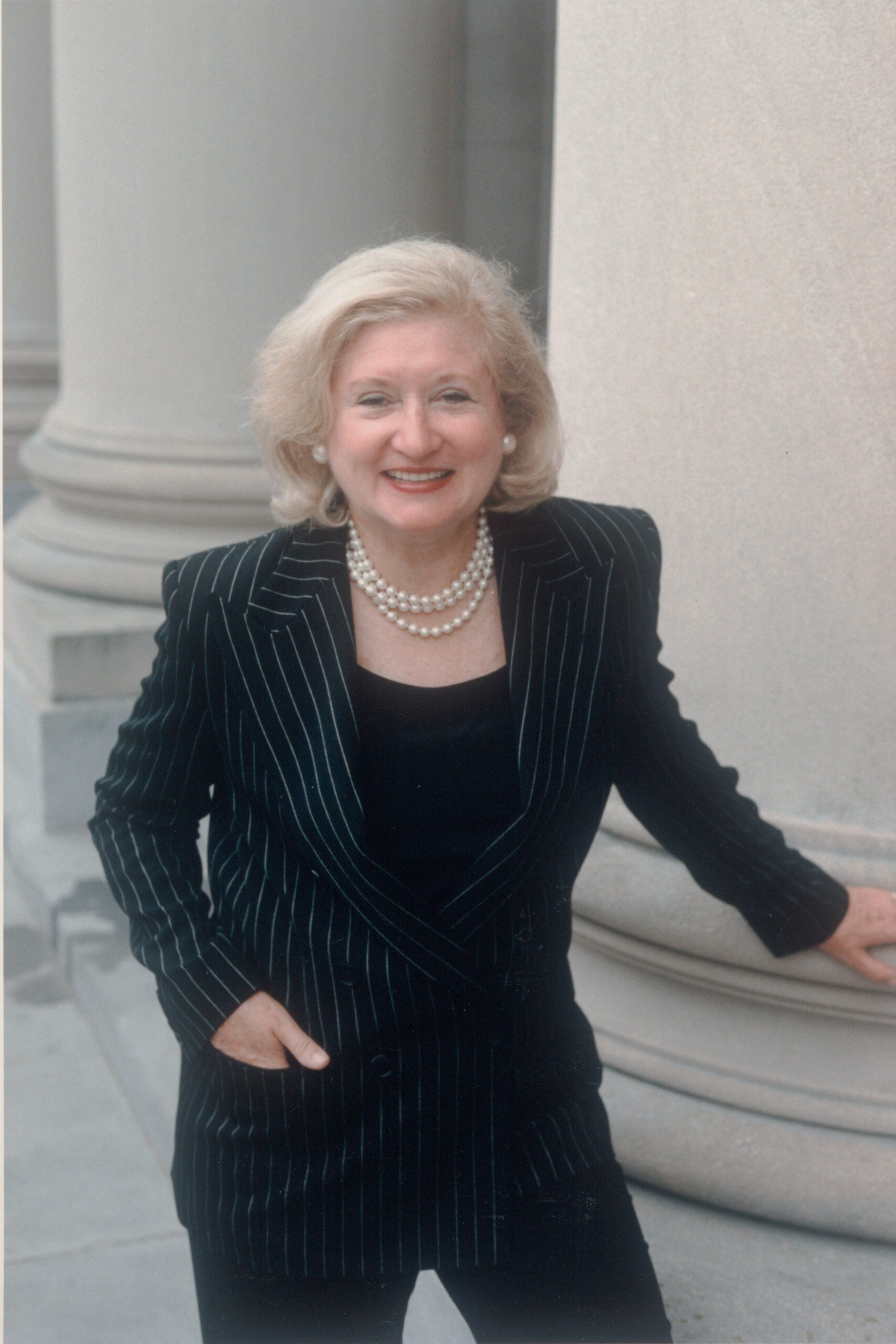
Judith Richards Hope ’64 has some kind of clout. Witness the guest list for a party earlier this year feting her book, “Pinstripes & Pearls.” The parade of the Washington elite included Supreme Court Justices Stephen Breyer ’64, Ruth Bader Ginsburg ’56-’58, Sandra Day O’Connor, Antonin Scalia ’60 and David Souter Ô66, along with Vice President Dick Cheney, Lynne Cheney, Federal Reserve Chairman Alan Greenspan and Solicitor General Ted Olson. A founder of and partner at the Washington, D.C., office of Paul, Hastings, Janofsky & Walker, Hope focuses her practice on issues relating to the federal government, such as privatization of government-owned entities. She served as vice chairwoman of the President’s Commission on Organized Crime and was associate director of the White House Domestic Counsel. Once, as a female student at HLS in the early ’60s, she was “taking the place of a man.” Now, she has taken her place as one of the most influential attorneys in the nation’s capital.
* * *
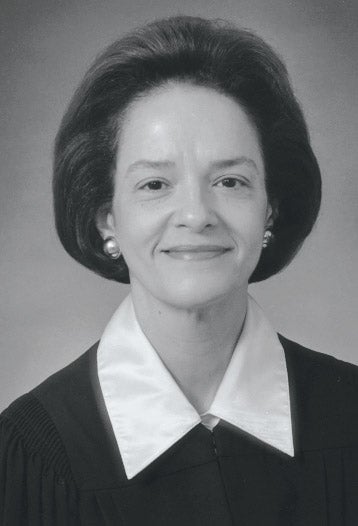
Many people remember that President George H.W. Bush chose Clarence Thomas to fill the Supreme Court seat vacated by Justice Thurgood Marshall, the first African-American on the nation’s highest court. But fewer may recall the person who took Thomas’ seat on the U.S. Court of Appeals for the D.C. Circuit, often viewed as the nation’s second most important court. It was Judith Rogers ’64, and her appointment was also a milestone: Rogers became only the second African-American woman to serve on a U.S. Court of Appeals. Previously, she served as associate judge and chief judge for the D.C. Court of Appeals and held several other public service positions, including corporation counsel for D.C., supervising an office of 200 attorneys.
In announcing her nomination to the Court of Appeals in 1993, the Clinton administration trumpeted Rogers’ devotion to the causes of fairness to children, delay reduction in the courts and civil rights for all citizens. The Washington Post at the time called her “a diligent and highly competent centrist.” And in her case, no one raised any objection to her nomination.
* * *
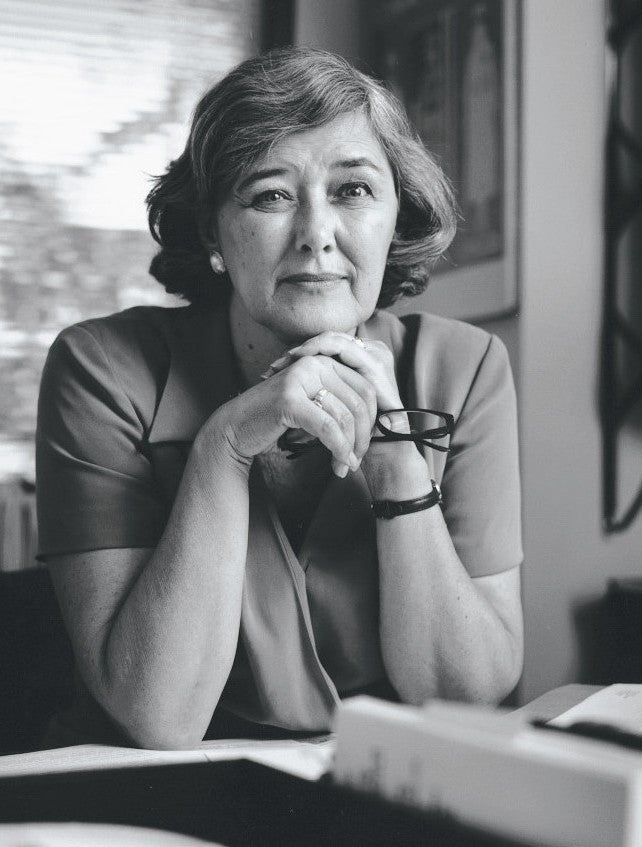
When Patricia Schroeder ’64 was first elected to Congress in 1972, people wrote to her about her clothes and hairdo. But she soon transcended the superficial attention and gained attention for her stands on issues such as abortion rights and military expenditures and her fight for the passage of the Family and Medical Leave Act 10 years ago. Shortly after leaving the House of Representatives, she detailed her struggles and successes in “24 Years of House Work É and the Place Is Still a Mess.” Today, as president and CEO of the Association of American Publishers, Schroeder advocates for protecting intellectual property and free speech rights. She also continues to champion women’s rights. “The years of hard work and struggle have led to some triumphs,” she said in a talk after leaving office, “but we also have to think about how far we have not come, and how much is left to do to improve the health, status and well-being of American women.” If women don’t do it, she has said, who will?
* * *
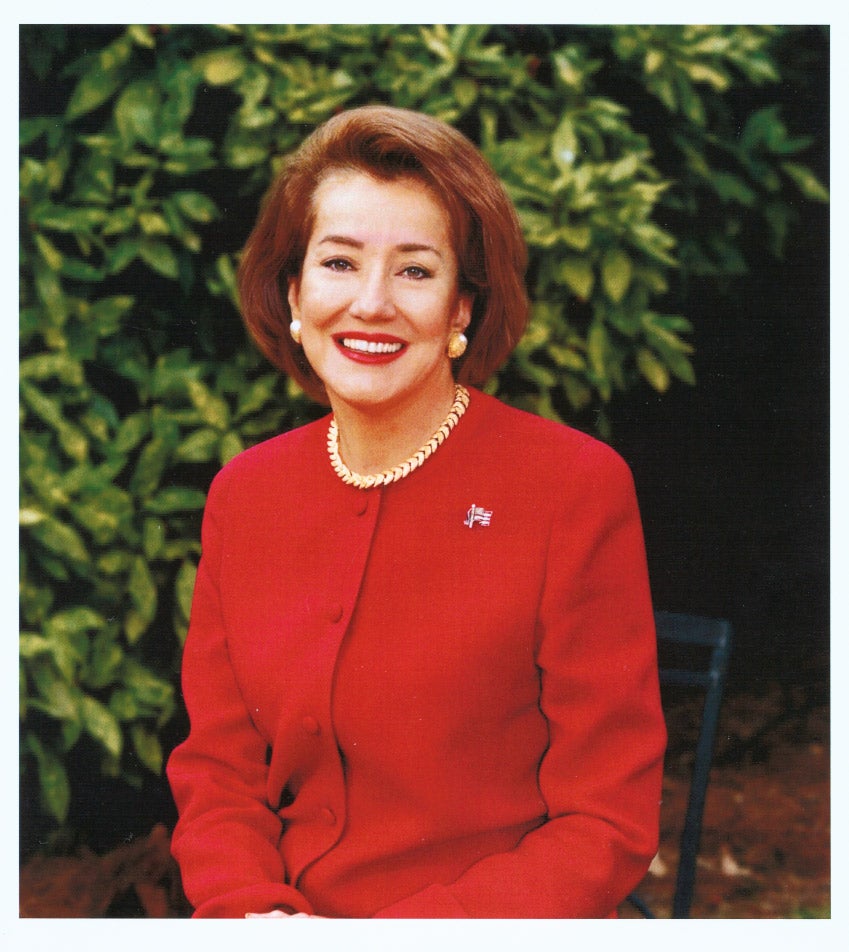
Elizabeth Dole ’65 grew up during a time when women were known primarily because of the achievements of their husbands. And she is certainly known because of her husband, former U.S. Sen. Robert Dole, the Republican candidate for president in 1996. But that, of course, is only part of the story.
Dole began on her own path of public service in 1969, when she served as deputy assistant to President Nixon for Consumer Affairs. Since then, she has been a member of the Federal Trade Commission, secretary of Transportation (the first woman to hold that post) for President Reagan and secretary of Labor for President George H.W. Bush. Outside of government, she served as president of the American Red Cross before running for the U.S. presidency. She would not become the first woman president, but she did become the first female senator from her home state of North Carolina, elected last year to succeed Jesse Helms. And now–like the man her husband ran against in 1996–her husband is known as the spouse of a senator.
* * *
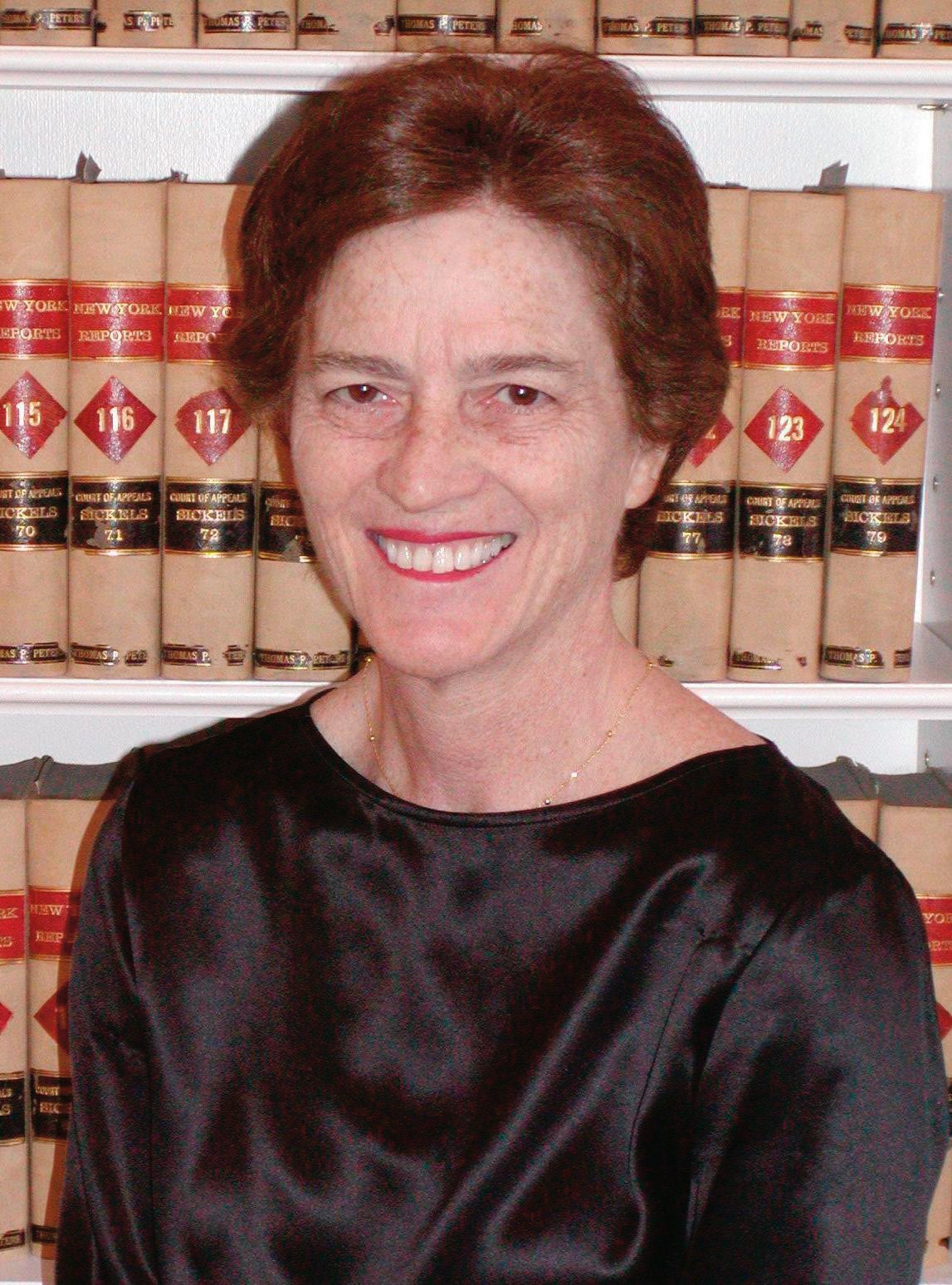
The first impression many Americans got of Elizabeth Holtzman ’65 was an indelible one. After beating an incumbent who had been in the House almost as many years as she had been alive, the youngest woman ever elected to Congress was thrust into the national spotlight as a leading White House critic on the House Judiciary Committee during the Watergate hearings. Yet that experience only began a career of taking on difficult battles. Currently a counsel at Herrick, Feinstein in New York City, Holtzman served in Congress for eight years before being elected district attorney of Kings County (Brooklyn, N.Y.), where she prosecuted white youths for a racial killing and worked to protect the rights of rape and child-abuse victims. In 1990, she was elected comptroller of New York City, the first woman in that post, becoming responsible for the city’s fiscal matters. She also worked to declassify the U.S. government’s war crimes files as a member of a presidential committee on Nazi war criminals. Holtzman details the stands she has taken and the challenges she has faced in a book whose title could serve as a coda for her career: “Who Said It Would Be Easy?”
* * *
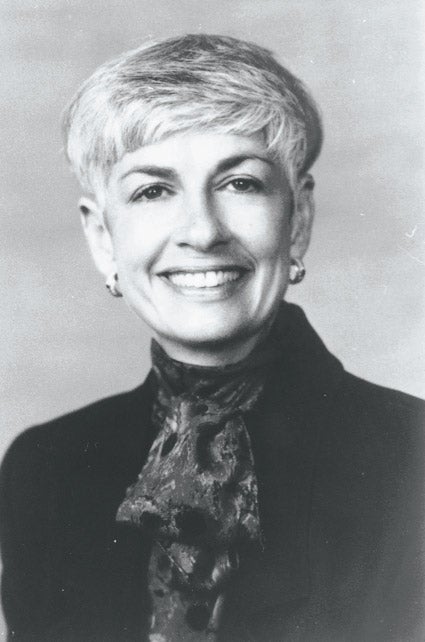
When she was an HLS student, Stephanie Seymour ’65 was the first woman to be on the winning team in the Ames Moot Court Competition. She would later judge the competition twice. But that was hardly all the judging she would do.
For nearly a quarter century, Seymour has served on the U.S. Court of Appeals for the 10th Circuit. Nominated by President Carter in 1979, she was the first woman on the 10th Circuit court and, from 1994 to 2000, the first woman to serve as chief judge. She also was the first woman to preside over the Judicial Conference of the United States, the chief administrative policy-making body of the federal courts.
Seymour, who was mentioned as a possible Supreme Court nominee during the Clinton administration, is known as a supporter of women’s and civil rights. And she made her feelings known even as a student. Before she won Ames, the names of the winners were listed with only their first initials. She told Dean Griswold that full names should be listed to show that women can compete too. The dean agreed.
* * *
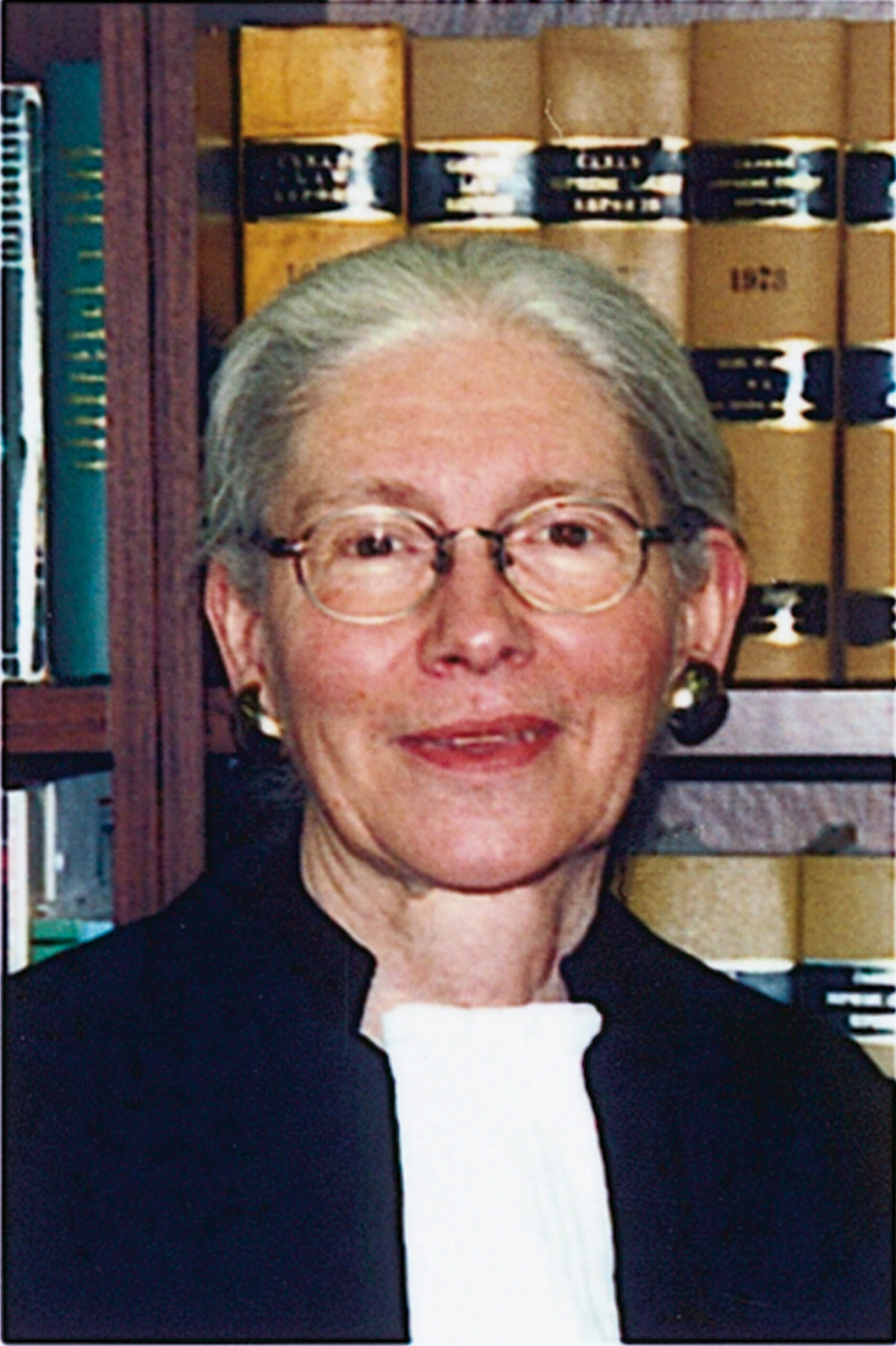
Before Alice Desjardins LL.M. ’67 came to Harvard Law, she worked as a professor. That’s not so unusual for LL.M. candidates, who often have distinguished legal careers all over the world before furthering their education at HLS. But Desjardins in particular made a splash in her classroom. In 1961, she became the first woman to teach full time in a Canadian law school when she taught constitutional law at the University of Montreal.
It wouldn’t be her last breakthrough. After serving as the director of advisory and administrative law in Canada’s Justice Department and as a justice on the Quebec Superior Court, in 1987 Desjardins was appointed to the Federal Court of Canada, Appeal Division, the first woman on the country’s second-highest court (she also became judge of the Court Martial Appeal Court of Canada soon after). In a prior interview with the Bulletin, she spoke of “the new energy released as more women attain positions of great responsibility.” And at Celebration 45, she introduced Supreme Court Justice Ruth Bader Ginsburg ’56-’58, praising her efforts to counter gender stereotypes. The same praise could be given for Desjardins.
* * *
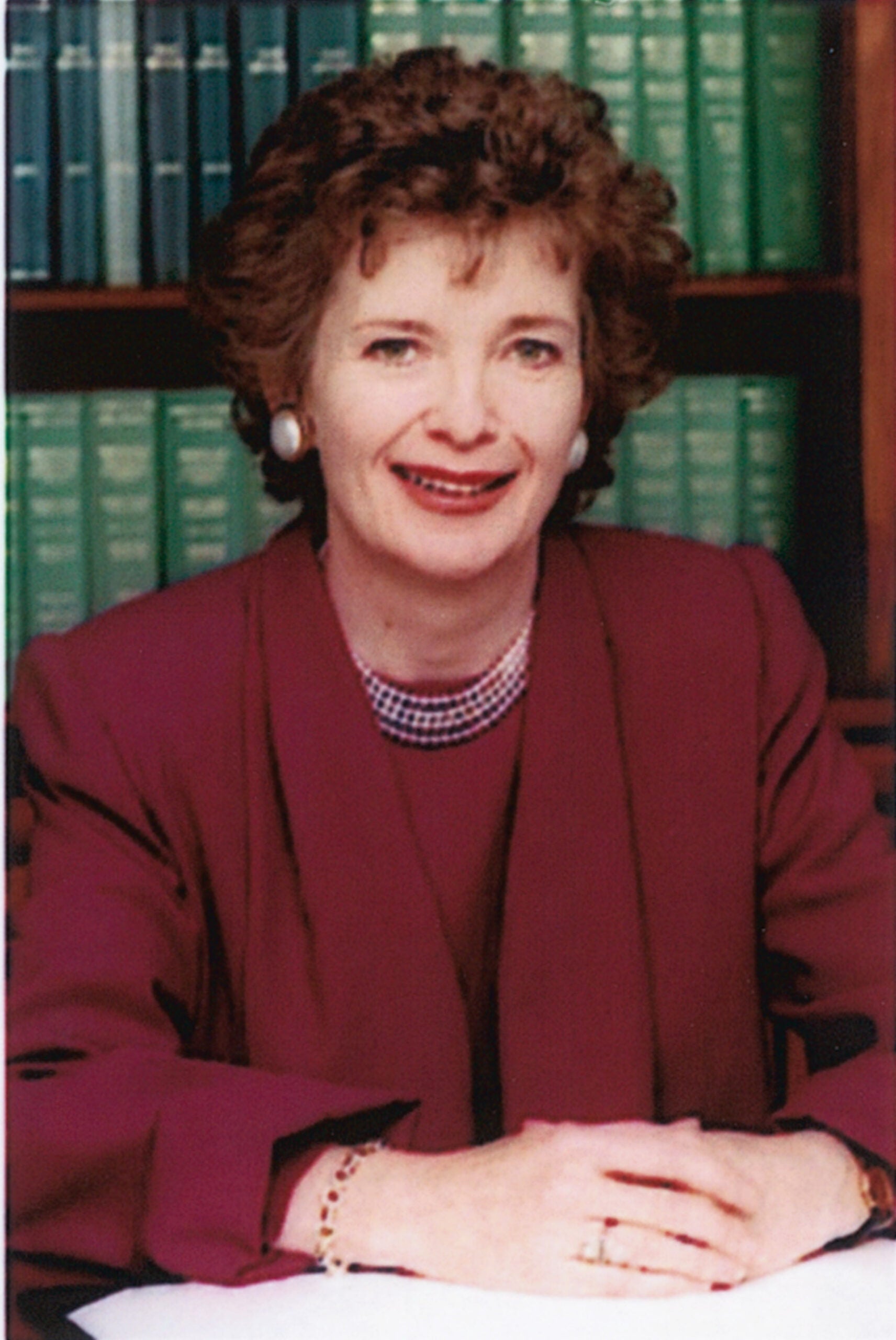
Of the more than 36,500 HLS alumni alive today, only one of them has served as president of a country. That’s Mary Robinson LL.M. ’68, who was president of Ireland for seven years. But it’s a testament to her achievements on the international stage that today she is just as well-known for her more recent job, as U.N. high commissioner for human rights. In that role, in which she served from 1997 to 2002, she traveled to many of the world’s trouble spots, including Rwanda, South Africa, Colombia and Cambodia, and in 1998, she became the first high commissioner to visit China. The U.N. office now has staff monitoring human rights in more than 20 countries. Her emphasis on human rights has been long-standing, dating from her successful fight for Irish women to obtain contraceptives in the ’70s. As president, she was an internationalist as well, the first head of state to visit Somalia during the 1992 famine and Rwanda after the 1994 genocide. She will continue to concentrate on global issues as director of the Ethical Globalization Initiative, working to make human rights standards the norm instead of merely a goal.
* * *
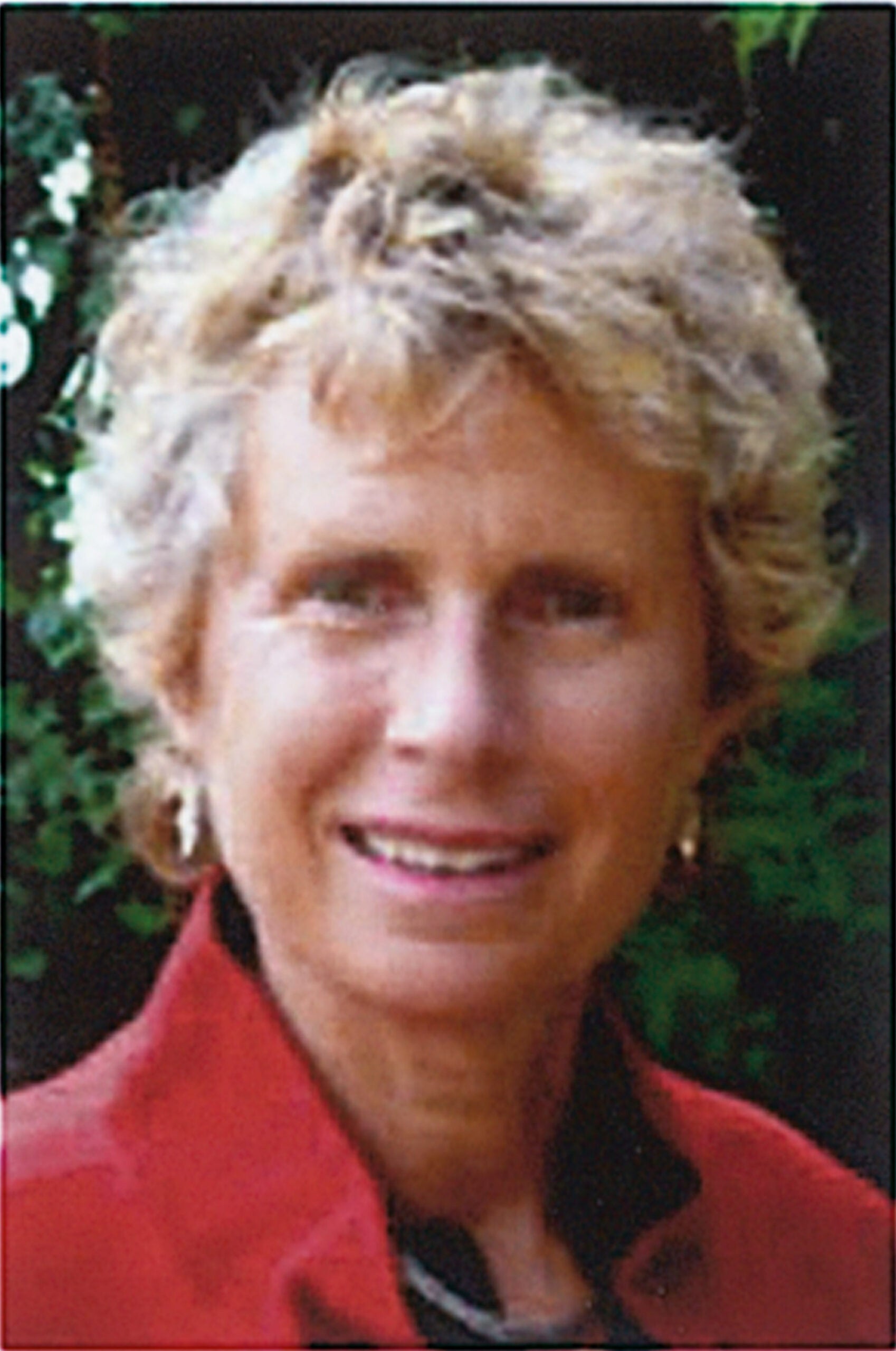
In a way, Harvard Law School was responsible for the creation of Ms. magazine. Brenda Feigen ’69, the magazine’s co-founder along with Gloria Steinem, says HLS turned her into a radical feminist, citing the treatment of women when she was a student at the school.
Motivated by her HLS experience, Feigen went on to become a stalwart of the women’s movement in the ’70s as a co-founder of the National Women’s Political Caucus and the Women’s Action Alliance. She also directed with Ruth Bader Ginsburg ’56-’58 the Women’s Rights Project of the ACLU and served as legislative vice president of the National Organization for Women. Currently an entertainment and literary lawyer, Feigen has represented producers, writers and actors, and herself produced the action movie “Navy Seals.” She chronicled her experiences in advocacy and entertainment in the memoir “Not One of the Boys: Living Life as a Feminist.”
It all started at HLS, where she learned her lessons well. Early in her career, she sued the Harvard Club of New York City in order to gain women graduates the right to become full members. She won.
* * *
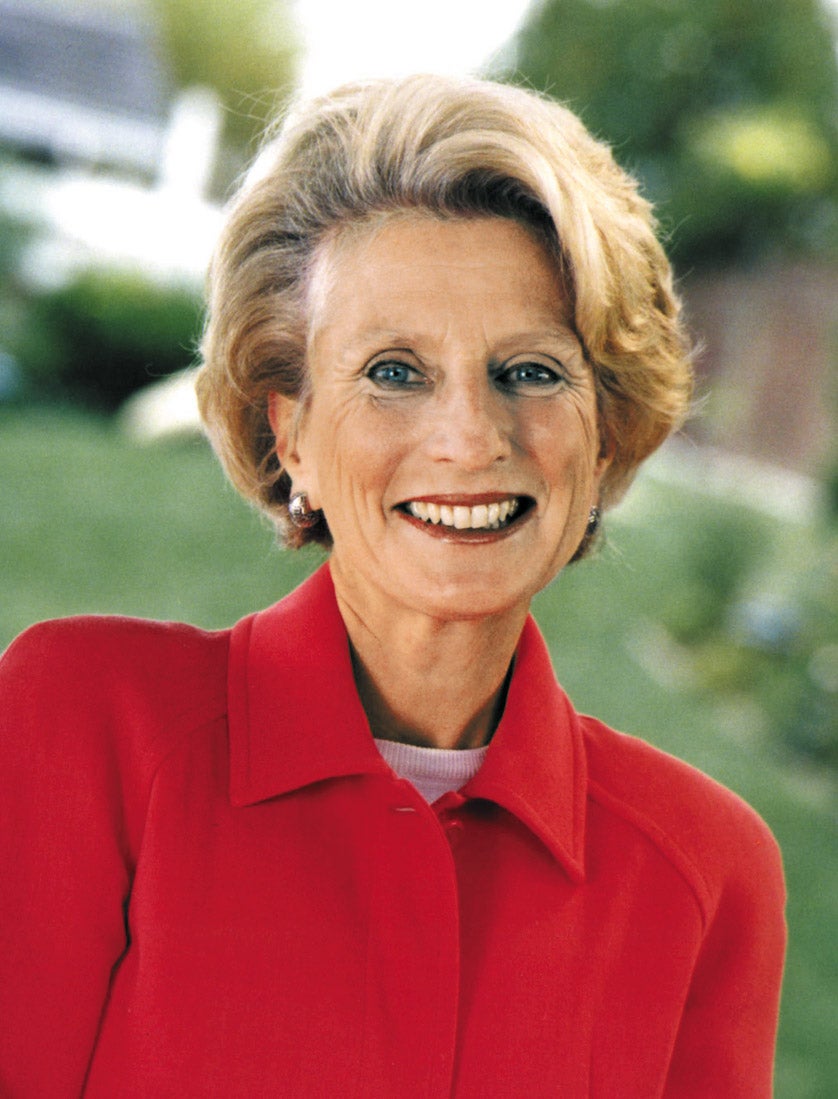
Jane Harman ’69 worried about domestic terrorism long before most people let it concern them. The ranking Democrat of the House Subcommittee on Terrorism and Homeland Security, she has focused on national security concerns during much of her tenure in Congress, including as a member of the National Commission on Terrorism. That body issued a report in 2000 warning of the dangers of terrorism strikes in the United States, and Harman spoke before Sept. 11, 2001, of the need to increase readiness against attacks. She is speaking even more now, having introduced legislation to strengthen the White House Office of Homeland Security and to improve the bioterrorism research facilities of the Centers for Disease Control. The winner of the Concord Coalition’s “Deficit Hawk” award, she also focuses on the fiscal security of the nation. The current House minority leader, Nancy Pelosi, told the Congressional Quarterly that Harman is “a leader not only in the House, but in the nation, on homeland security issues.” And now, when Jane Harman speaks, people listen.
* * *
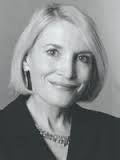
Janet Benshoof ‘ 72 graduated from HLS shortly before the Supreme Court handed down the Roe v. Wade decision. Since then, she has devoted her career to protecting a woman’s right to have access to contraception and abortion, serving as director of the American Civil Liberties Union’s Reproductive Freedom Project and in 1992 founding the Center for Reproductive Law and Policy (now called the Center for Reproductive Rights). Currently president emerita after resigning last year, Benshoof led the organization to Supreme Court victories in cases involving nonconsensual drug testing of pregnant women and a state ban of late-term abortion. She has been called “one of the nation’s foremost experts on reproductive rights and privacy law” by the Association of Reproductive Health Professionals, which gave her its annual award in 2000. Her reach has extended internationally as well, with the center working on reproductive health issues with more than 50 organizations in 44 countries. She litigated against the Global Gag Rule requiring organizations that receive U.S. aid not to speak about abortion. Being silent about, as she puts it, “women’s right to equality and women’s rights to control their reproductive destinies” goes against everything she has fought for.
* * *
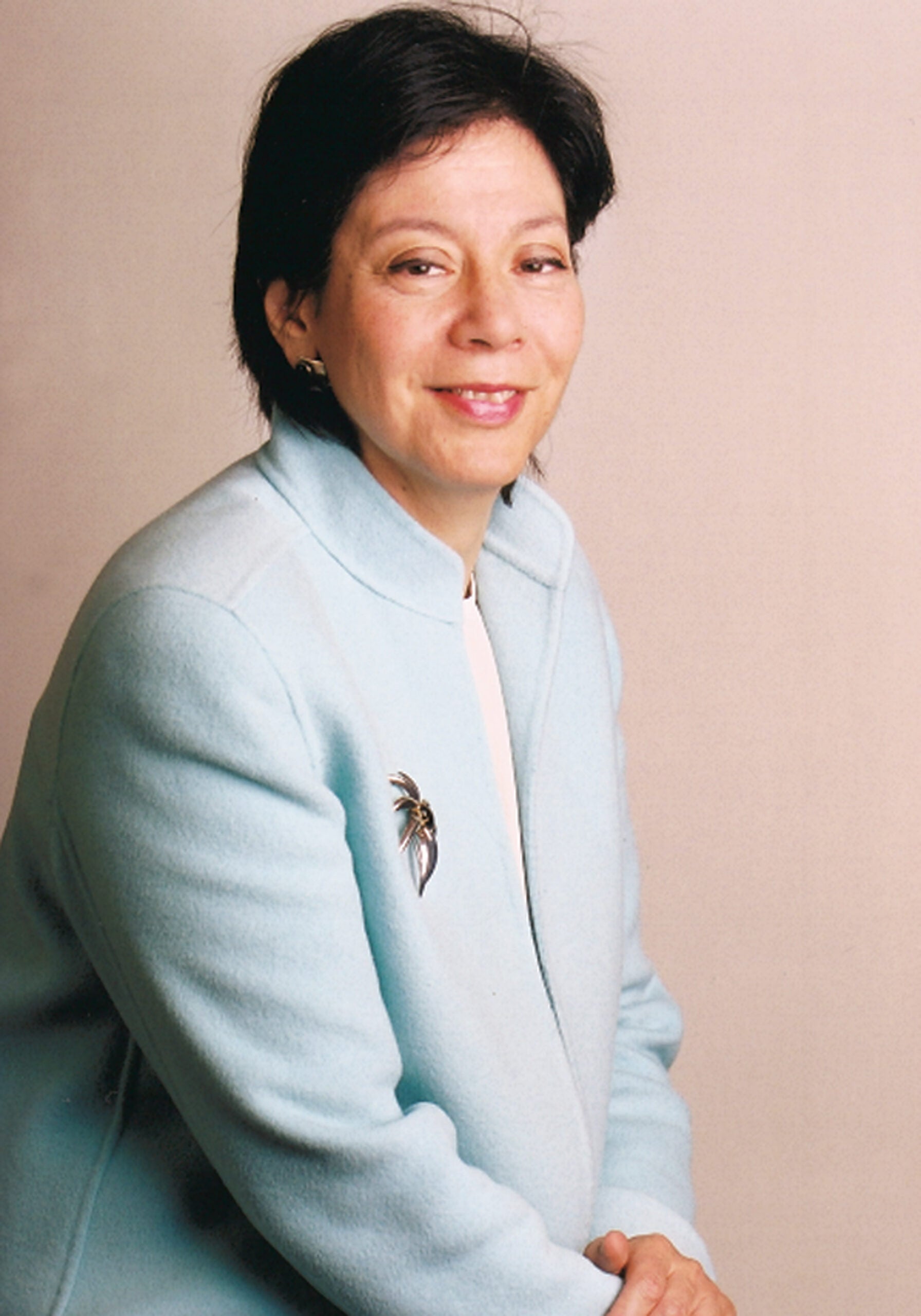
The newspaper that broke the Watergate scandal has a reputation to uphold. And that means not being afraid to report on issues that may cause the newspaper to be sued. As vice president, secretary and general counsel of the Washington Post Co., Diana Daniels ‘ 74 tries to prevent lawsuits against her company but also works to ensure that reporters can do their jobs in the way Post readers expect. She learned when she started as assistant counsel with the company in 1978 that her role was “to work out the language in a way that would allow [reporters] to run the story,” she said in a recent National Law Journal profile.
Daniels has worked for media companies most of her career, jumping from the Post to its subsidiary Newsweek in 1979 before returning to become the Post’s general counsel in 1988. Today, she supervises 17 attorneys who handle in-house duties such as acquisitions, SEC compliance and employment issues, and oversees outside counsel on litigation matters. She also files amicus briefs in support of other parties in First Amendment cases, advocating that all presses–not just her company’s–remain free.
* * *
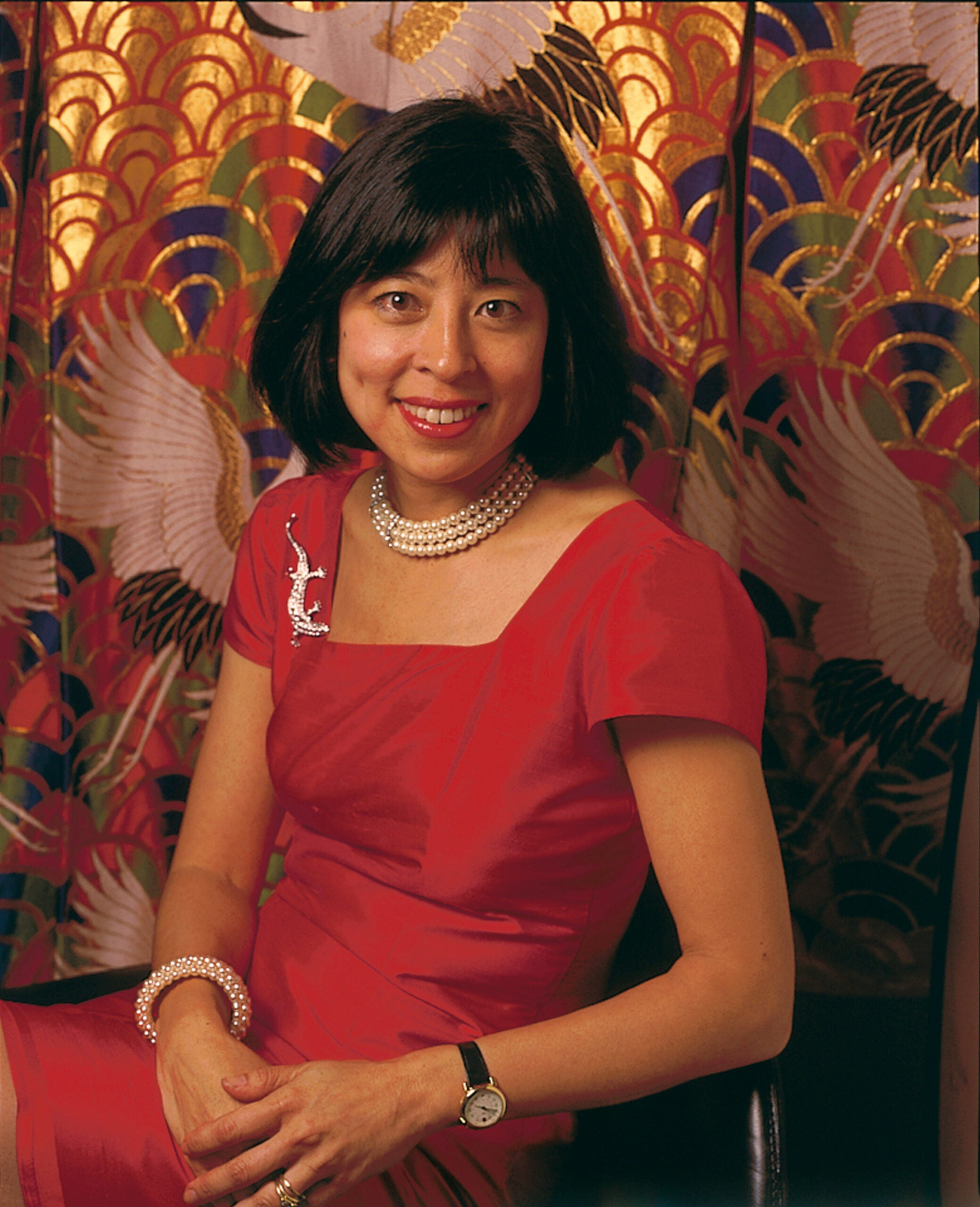
No matter what you accomplish in life, sometimes people remember you for something comparatively trivial. That may be the case with Alice Young ‘ 74, a corporate and international business attorney who speaks five languages, has done business deals and advised companies throughout the globe, served as an adviser to the U.S. Department of Commerce, represents clients in a wide range of disciplines, has been featured in The New York Times, Fortune, Forbes, Business Week and Newsweek, has appeared on CNN, “The NewsHour with Jim Lehrer,” “The Charlie Rose Show,” “Nightline” and the China Television Network, has been named one of the top 100 minority executives and one of the five most influential Asian-American corporate lawyers in the country, lectures on law, business and foreign policy issues and was highlighted in the book “Working Women for the 21st Century.” All that, and the Dewar’s profile still stands out, in which the partner at Kaye Scholer in New York City called herself a “gentle dragon lady.” But she summed herself up in a more serious way in the profile, as an “attorney, wife, mother, daughter, Asian and dreamer, not necessarily in that order.” Cheers to that.
* * *
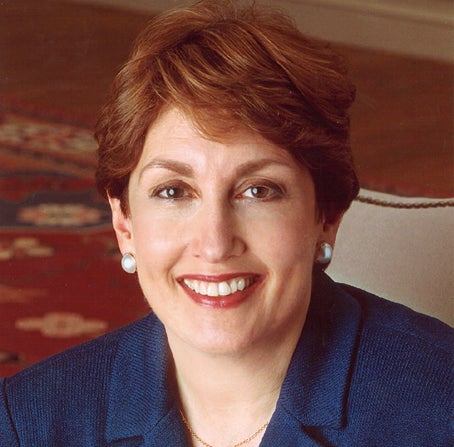
Janet Reno ’63 got much of the attention for being the first female attorney general of the United States. But another woman–and another Harvard Law alumna–served alongside her. Jamie Gorelick ‘ 75 was Reno’s deputy from 1994 to 1997, the chief operating officer and second-ranking official in the Justice Department, which during her tenure had an operating budget of $18 billion and employed more than 100,000 people. In that role, she concentrated on helping the department prepare for the threat of terrorism, experience she draws on now as a member of the national commission investigating the Sept. 11 terrorist attacks. She has long served the public, including as general counsel of the Department of Defense. Currently vice chairwoman of Fannie Mae, the nation’s largest source of financing for home mortgages, Gorelick has helped expand community development efforts and minority lending, and was among Fortune magazine’s most recent “Fifty Most Powerful Women in American Business.” She will leave the job in July to devote more time to the commission, having helped countless people, said Fannie Mae Chairman Franklin Raines ’76, achieve the “American Dream.”
* * *
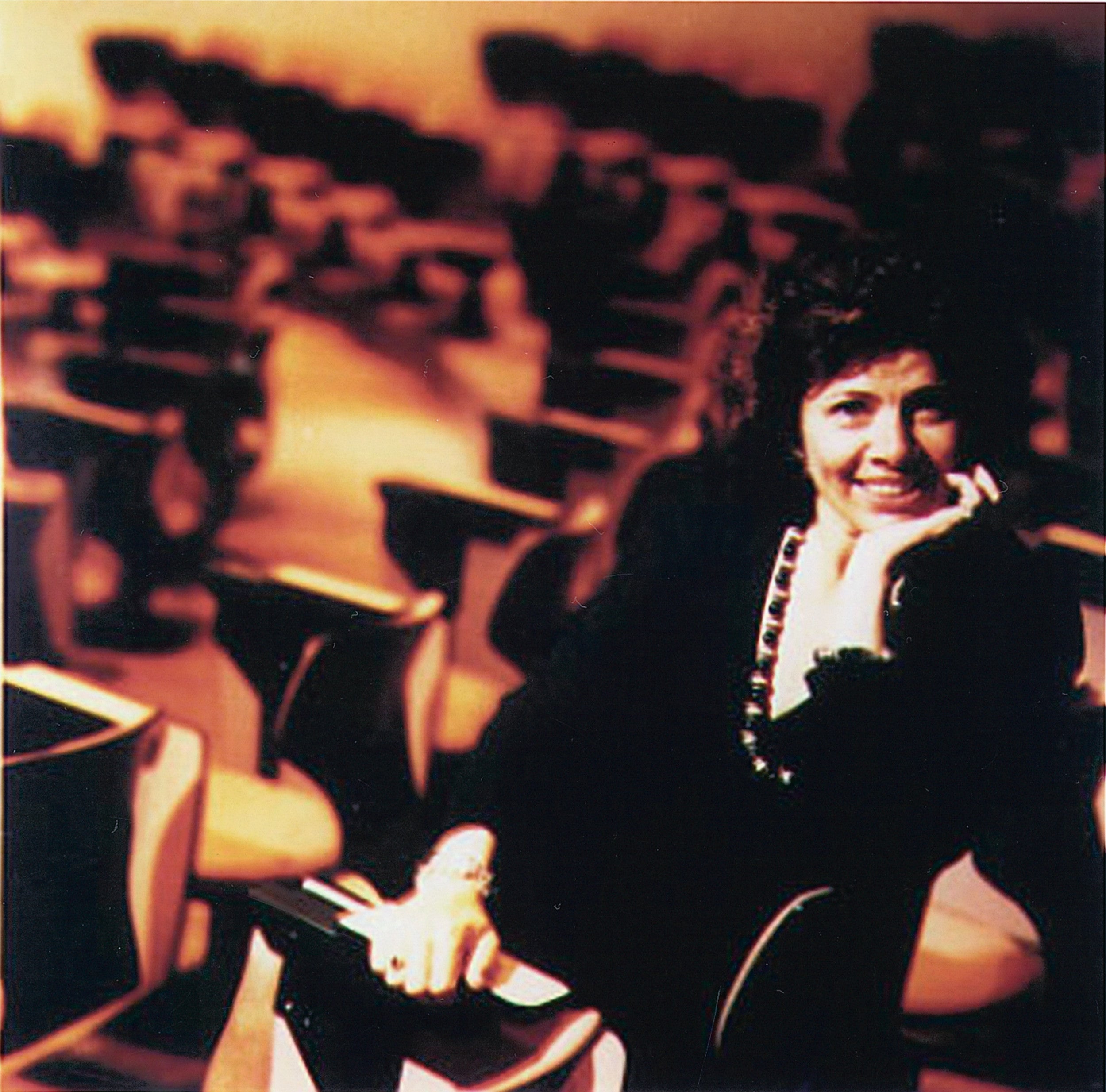
Nadine Strossen ‘ 75 could have maintained a quiet academic life as a professor at New York Law School, where she teaches constitutional law and international human rights. But not while her name is attached to four little letters: ACLU. Strossen’s life has been anything but quiet since she assumed the presidency of the American Civil Liberties Union in 1991, the first woman to serve as head of the nation’s oldest–and most controversial–civil liberties organization. As ACLU president, she is a media fixture and makes more than 200 appearances a year, many at college campuses, speaking on many of the hot-button issues of the day and against what she sees as government intrusion in private lives. She has been busy lately, criticizing Bush administration efforts to fight terrorism, like the USA Patriot Act, which she says infringe on civil liberties. Her 1995 book, “Defending Pornography: Free Speech, Sex, and the Fight for Women’s Rights,” cemented her reputation as an absolute advocate for free expression. Some people may not agree with her, but she’d be happy–anytime, anyplace–to defend her beliefs.
* * *
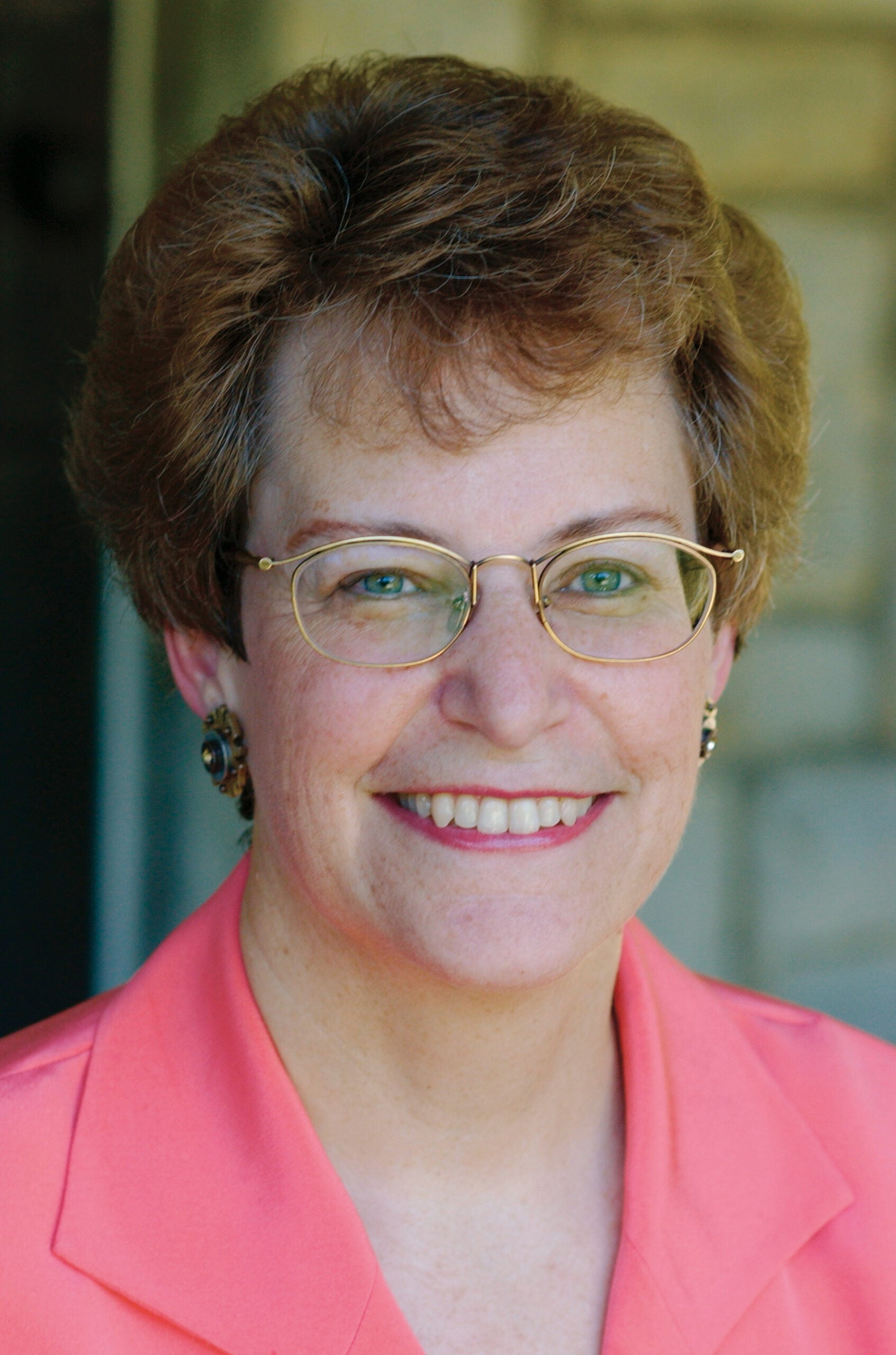
Skidmore College, a women’s college until the early ’70s, had only male presidents throughout its history. That changed in 1999, when the school hired Jamienne Studley ‘ 75. A champion for the liberal arts, she will step down as president at the end of the current academic year, having brought an infusion of students and money to the Saratoga Springs, N.Y., college. Skidmore enjoyed three record fund-raising years and a 25 percent increase in its endowment as well as a growth in admissions under Studley’s leadership. She also developed a 10-year strategic plan for the school and emphasized improving student access to college and assessing educational quality and effectiveness.
Before assuming the Skidmore presidency, Studley served as deputy, then general counsel, of the U.S. Department of Education from 1993 to 1999 and previously was an associate dean and lecturer at Yale Law School. She has not announced her next career move but said she will pursue what she cares about most: “education, equity and opportunity, and civic and community engagement.”
* * *
For Patricia Williams ‘ 75, the personal is indeed the political. The professor at Columbia Law School has long incorporated her personal story into her academic and popular writing on race, class, gender and the law, well enough and bold enough to capture the attention of the MacArthur Foundation, which in 2000 awarded her a “genius grant” of $500,000. “Her voice,” according to the foundation, “has created a new form of legal writing and scholarship that integrates personal narrative, critical and literary theory, traditional legal doctrine, and empirical and sociological research.”
Often challenging prevailing theory, including what she terms “the normality that’s made a cult of the standard of the reasonable man,” Williams inspires critics and devotees. The great-great-granddaughter of a slave and a white Southern lawyer, she has examined the problem of race relations in America and other contentious topics, writing three books and many opinion pieces, including a regular column in The Nation. On her HLS experience, she wrote: “My abiding recollection of being a student at Harvard Law School is the sense of being invisible.” Williams has ensured that she is invisible no more.
* * *
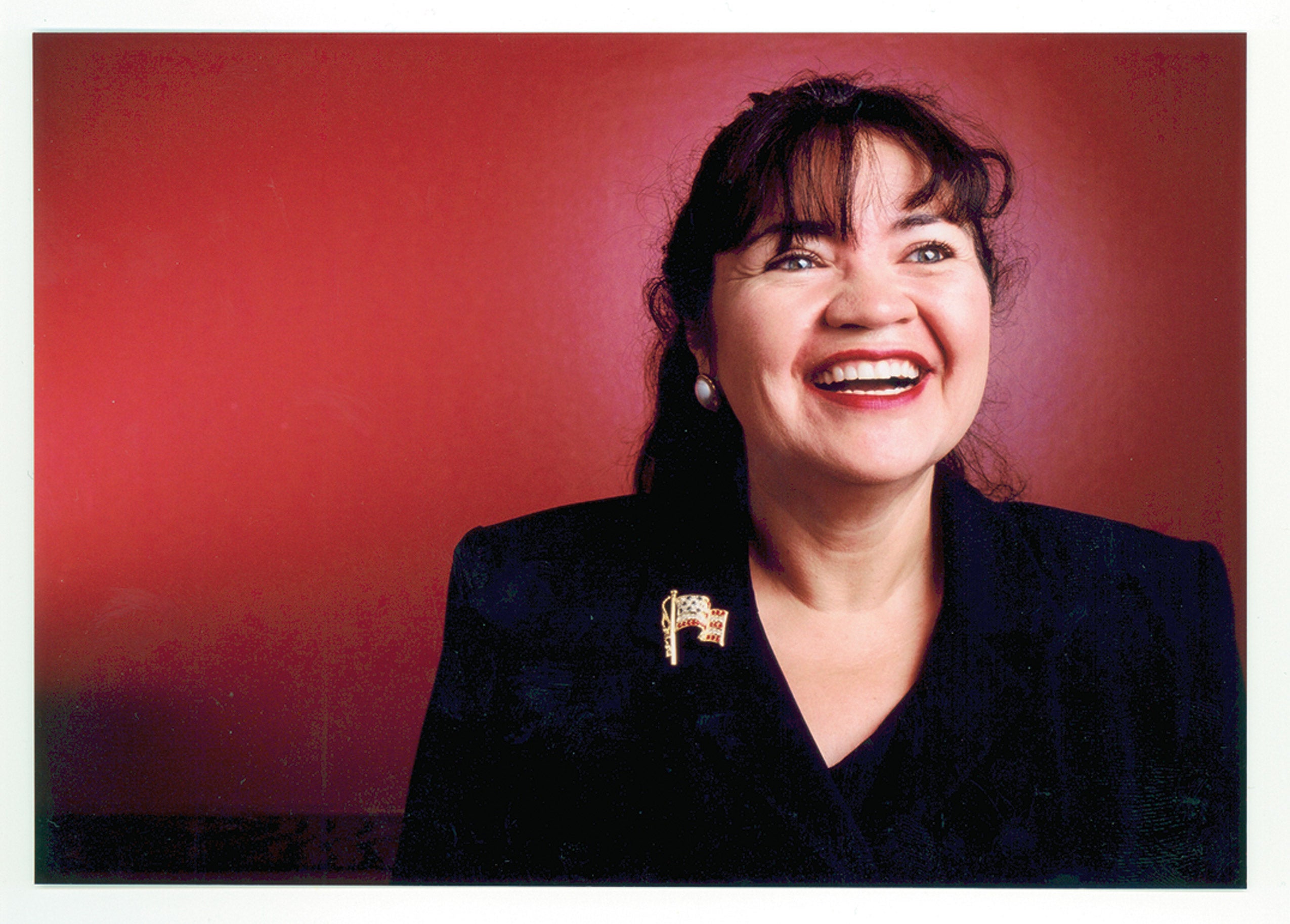
Norma Cantu ‘ 77 taught high school English when she was barely older than a typical high schooler herself. And since graduating law school at age 22, she has focused on bringing to all Americans the same kinds of educational opportunities that she enjoyed.
As the assistant secretary of Education for Civil Rights for the eight years of the Clinton administration, Cantu served as the nation’s chief civil rights enforcer in the educational arena, overseeing a staff of 850 and dramatically increasing the number of discrimination complaints resolved by the office. Considered an aggressive advocate for minority, disabled and female students, Cantu also championed enforcement of Title IX, ensuring that schools provide opportunities for males and females to participate in sports. Before her stint in the U.S. Department of Education, she served as regional counsel and education director of the Mexican-American Legal Defense and Educational Fund, litigating a variety of cases involving funding, educational access and racially hostile environments. Today, she teaches both education and law at the University of Texas, a combination that has always been a part of her career.
***
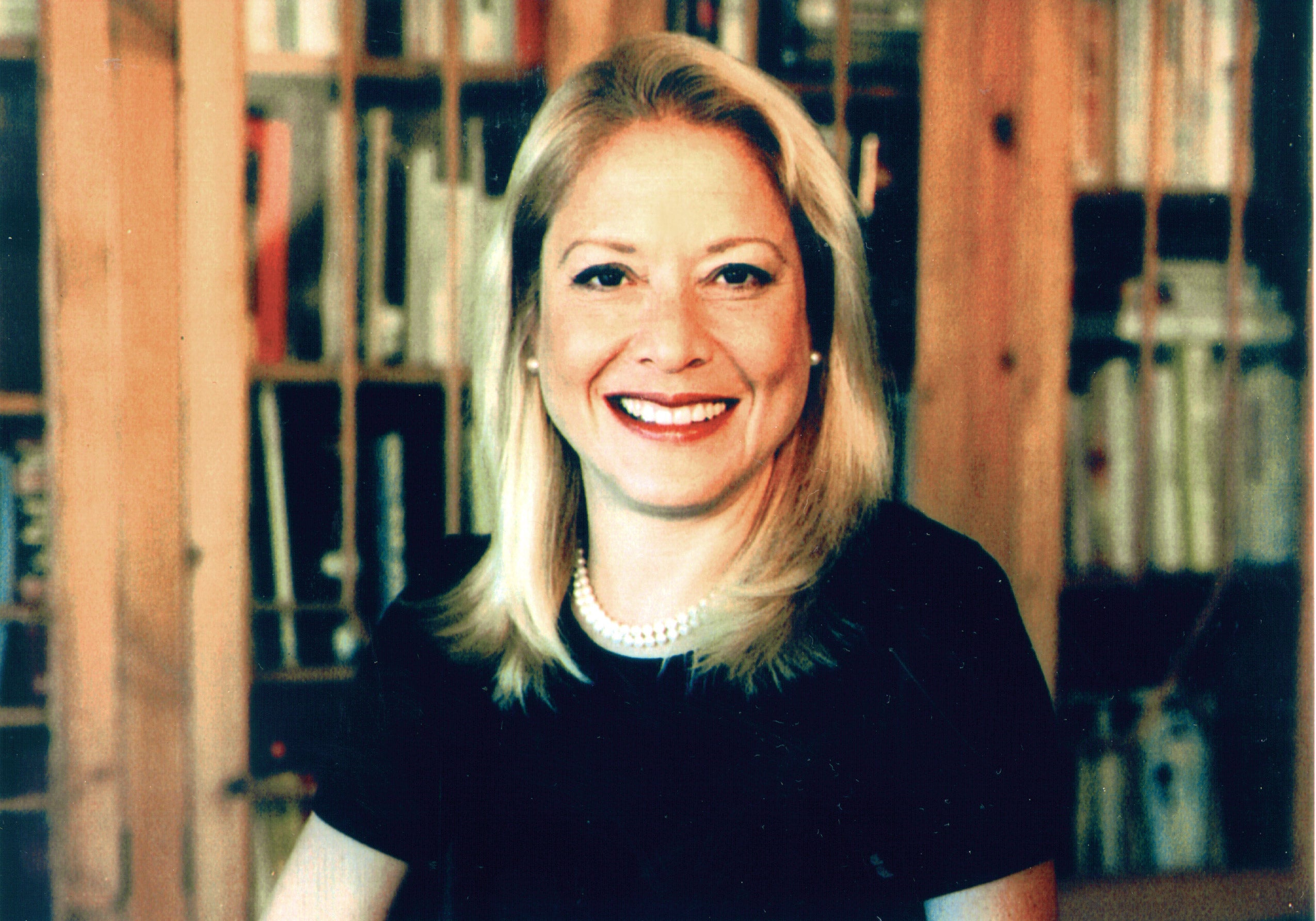
The term “Renaissance woman” still cannot be found in Webster’s dictionary. The editors clearly haven’t met Susan Estrich ‘ 77, a woman who can write and speak with equal facility on disparate topics such as rape and murder, diet and health, and politics and power. And her work has been published in publications ranging from the Yale Law Journal and the New England Journal of Public Policy to Harper’s Bazaar and USA Today. She also ran a presidential campaign–for Michael Dukakis ’60 in 1988–and now runs a classroom as a professor at the University of Southern California Law School. At HLS, she was the first woman president of the Harvard Law Review and, at 33, the youngest woman to receive tenure at the school. In her fifth and most recent book, “Sex and Power,” Estrich writes on how women still face a glass ceiling in the business and political worlds and advises them on how to break it. It’s advice she practices as well as preaches.
* * *
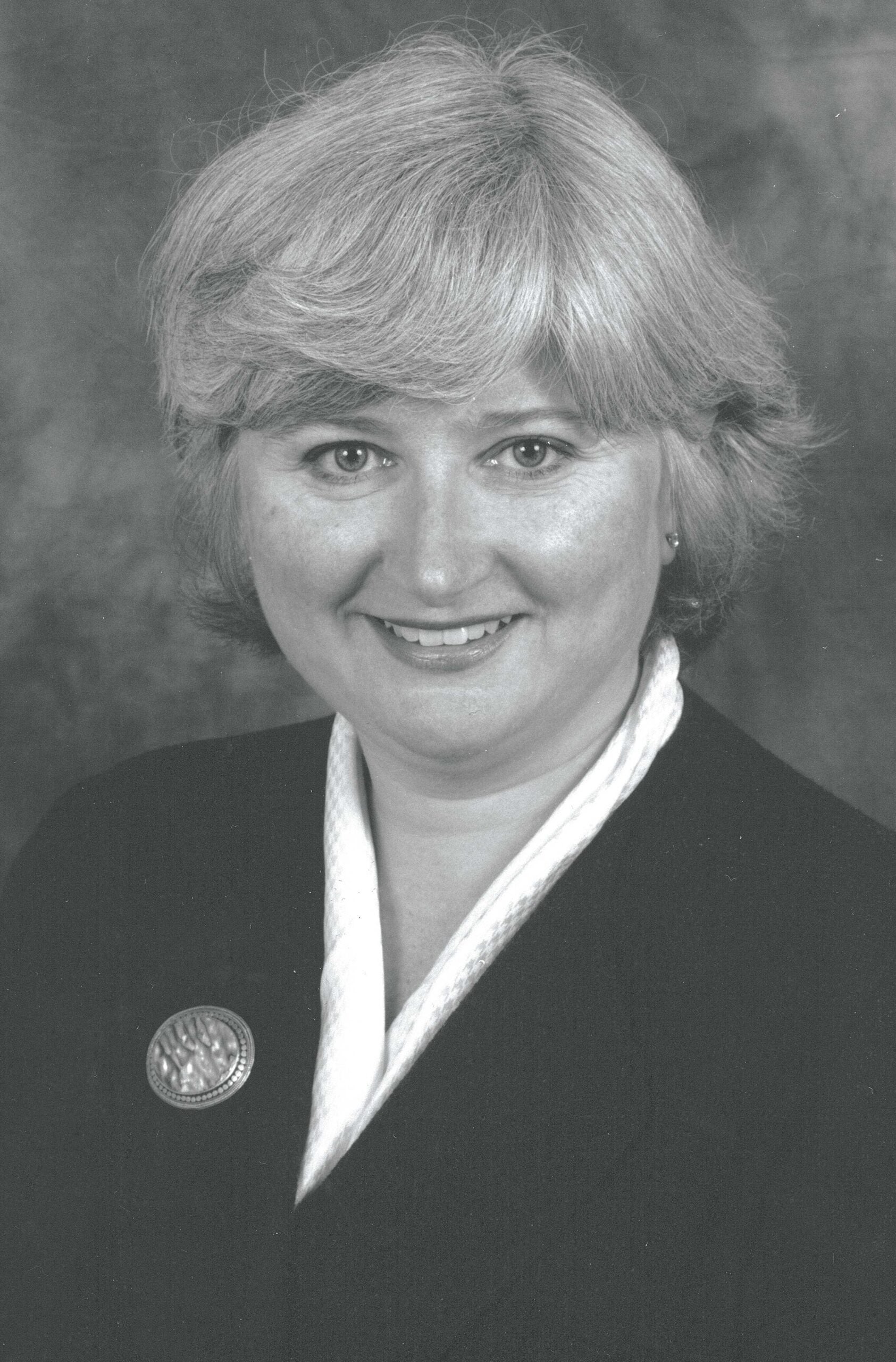
Debora de Hoyos ‘ 78 was part of the generation of women who changed law firms from nearly all-male enclaves of attorneys. But she did much more than that. In 1991, she became the first woman named managing partner of a large U.S. law firm, a position she has held ever since, at Mayer, Brown, Rowe & Maw in Chicago. She joined the firm right out of law school and has “grown up with the firm,” as the previous managing partner said. The firm, too, grew since she started as an associate, from 150 lawyers to one of the 10 largest law firms in the world, with more than 1,300 attorneys in seven U.S. and six European cities.
Before gaining the position, de Hoyos was known for her transaction work, including complex international debt-for-equity swaps. “I still get excited by deals,” she told The New York Times when she became managing partner.
At first, she says, she didn’t much appreciate being recognized because of her gender rather than for her work. But that changed when a male client told her how happy he was when she got the managing partner job. He was thinking about his two daughters.
* * *
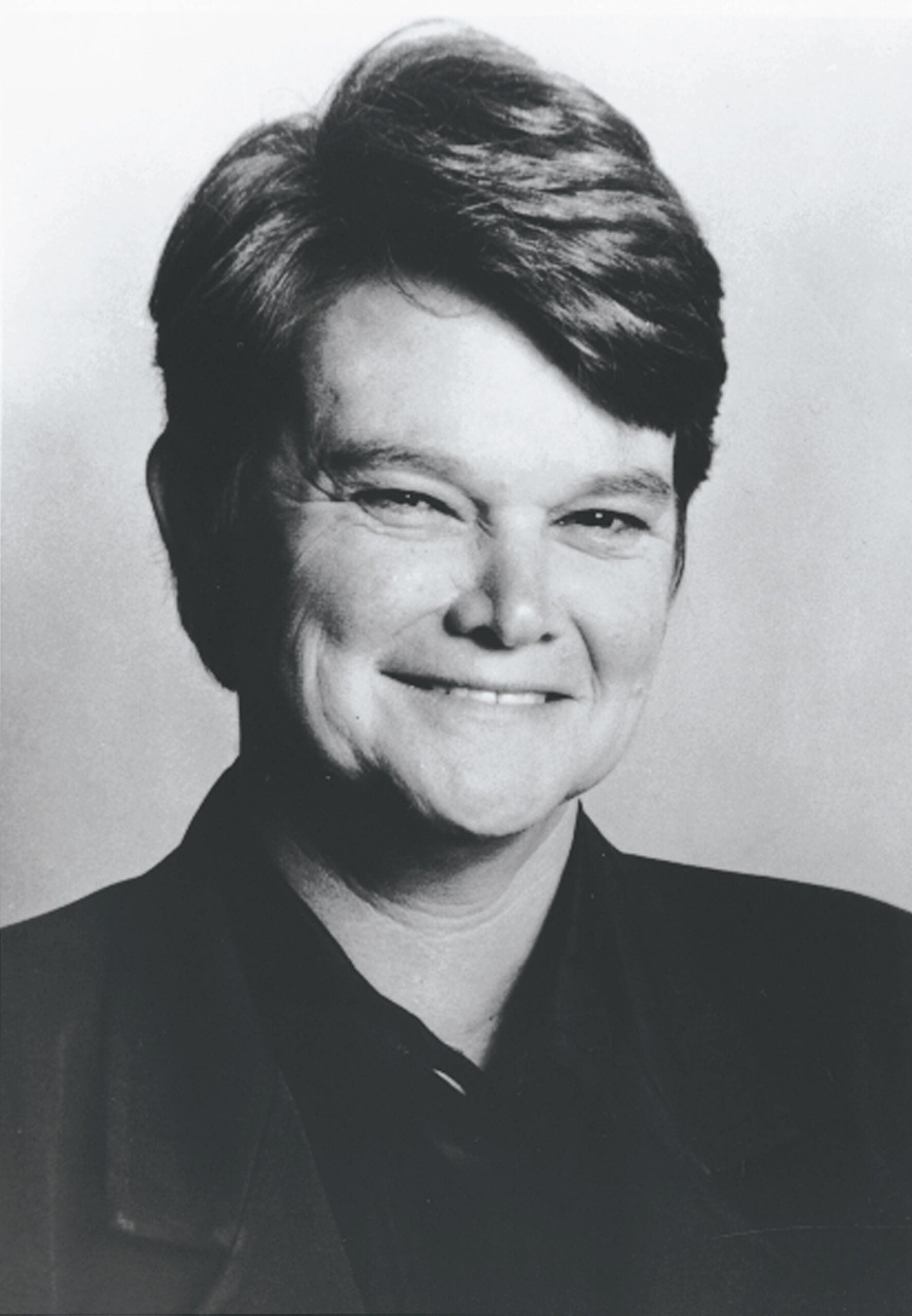
You could call her story “The Many Lives of Sheila Kuehl ‘ 78.” First was the child actor who played the spunky Zelda Gilroy on “The Many Loves of Dobie Gillis.” Then the Harvard Law student, the second woman in the school’s history to win the moot court competition, who graduated in 1978. Then the civil rights attorney and co-founder of the California Women’s Law Center and law professor and, finally, in what has become her best-known role, a state legislator in California. The first woman to be named speaker pro tempore of the California Assembly and the first openly gay or lesbian state legislator in the state’s history, Kuehl has authored scores of bills passed into law, many to prevent domestic violence and discrimination and to expand health care and education. “When I first entered law school at Harvard in 1975, there were very few, if any, who were truly out,” she said when nominated to the Harvard University Board of Overseers, on which she now serves. “In fact, it was a time of fledgling feminism–to be a woman was to struggle for full citizenship.” Kuehl has done her part to make that struggle a thing of the past.
* * *
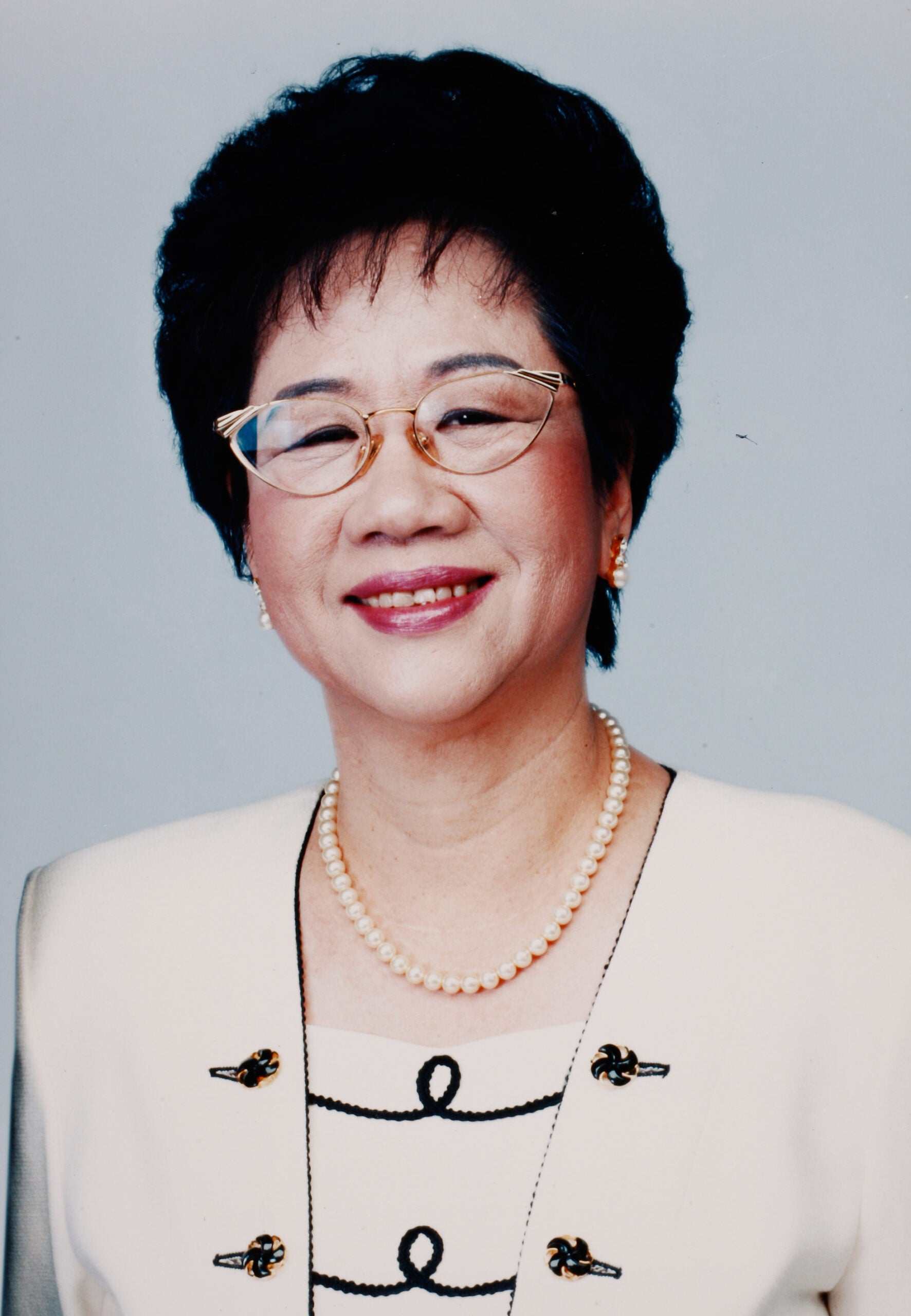
Not many HLS graduates have served hard time. And fewer would make that ordeal a part of their resume or, indeed, a badge of honor. But for Hsiu-lien Annette Lu LL.M. ‘ 78, a prison sentence was the result of her passionate advocacy for democracy, a passion that culminated in her own election three years ago as vice president of Taiwan. A leader of the opposition movement after she returned home from HLS, she spent five years in prison on the charge of sedition after criticizing the government in 1979. Known as a feminist and women’s rights activist, Lu has always spoken out for what she believes in, calling the new government a symbol of “social equality and harmony” and “political rule by both sexes.” She has traveled the world promoting these ideals and in 2001 became the first woman to win the World Peace Prize from the World Peace Corps Academy. As much as anyone, Lu understands the importance of freedom.
* * *
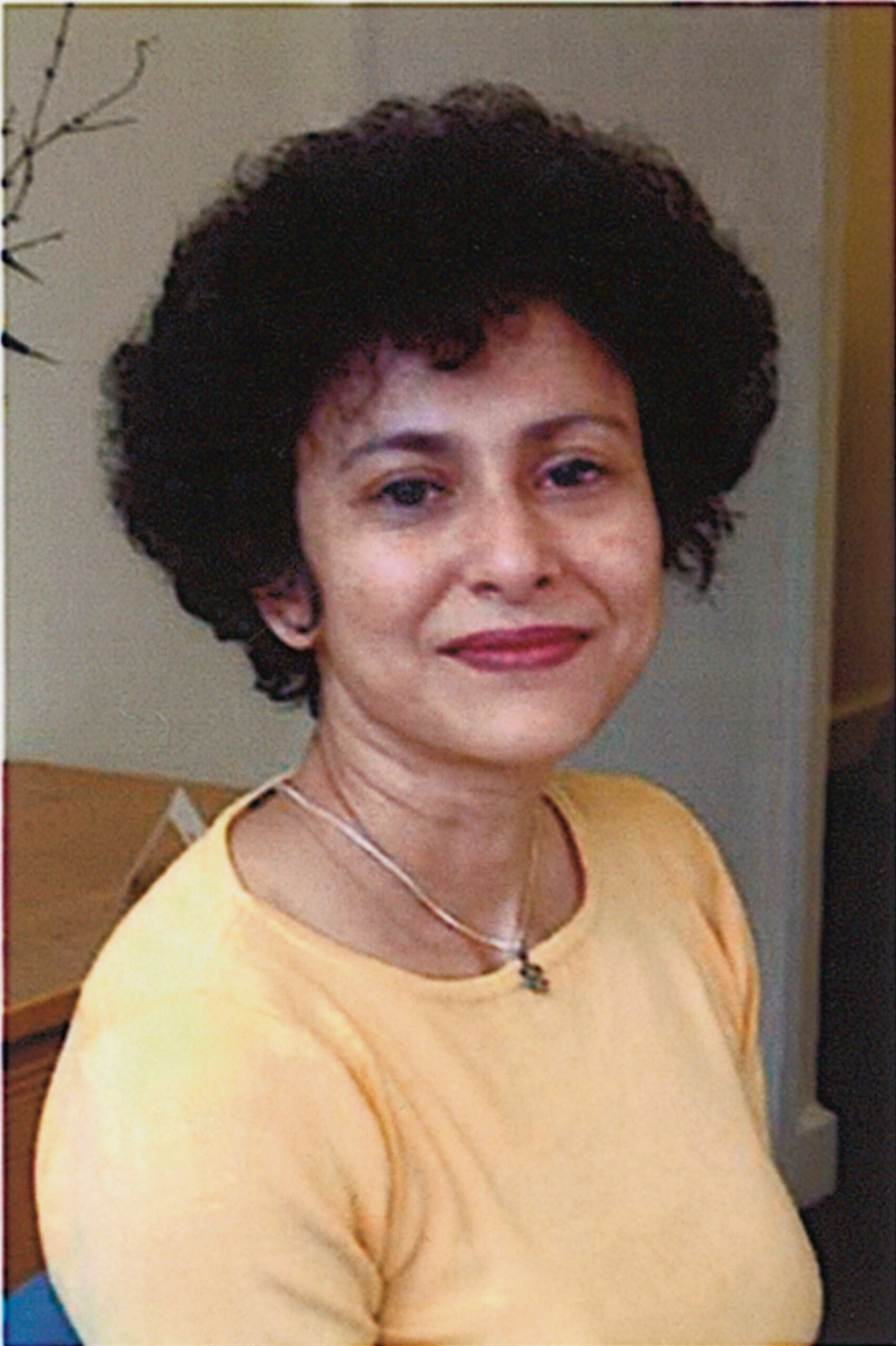
Irene Khan LL.M. ‘ 79 will not be afflicted with compassion fatigue. That’s because she is inspired over and over again by the personal stories of those she meets as secretary general of Amnesty International, like the Afghan woman in a refugee camp wearing a torn, dirty burka, who spoke about her dream of returning home and becoming a scientist. “Our challenge is to mobilize millions of people across the globe in solidarity with the victims, to know their names, their faces, their identities, their stories,” said Khan when she was named head of the London-based international human rights organization in 2001.
The first woman, Asian and Muslim to lead Amnesty, Khan relies on a million members from 140 countries to send the message that they care about victims of political persecution and imprisonment. In the post-Sept. 11 environment, she has also spoken out against human rights violations committed in the name of security, and in meetings with world leaders, she has emphasized better protection of women’s rights. After spending much of her career with the Office of the U.N. High Commissioner for Refugees, Khan knows how to speak for the victimized and to those who can help them.
* * *
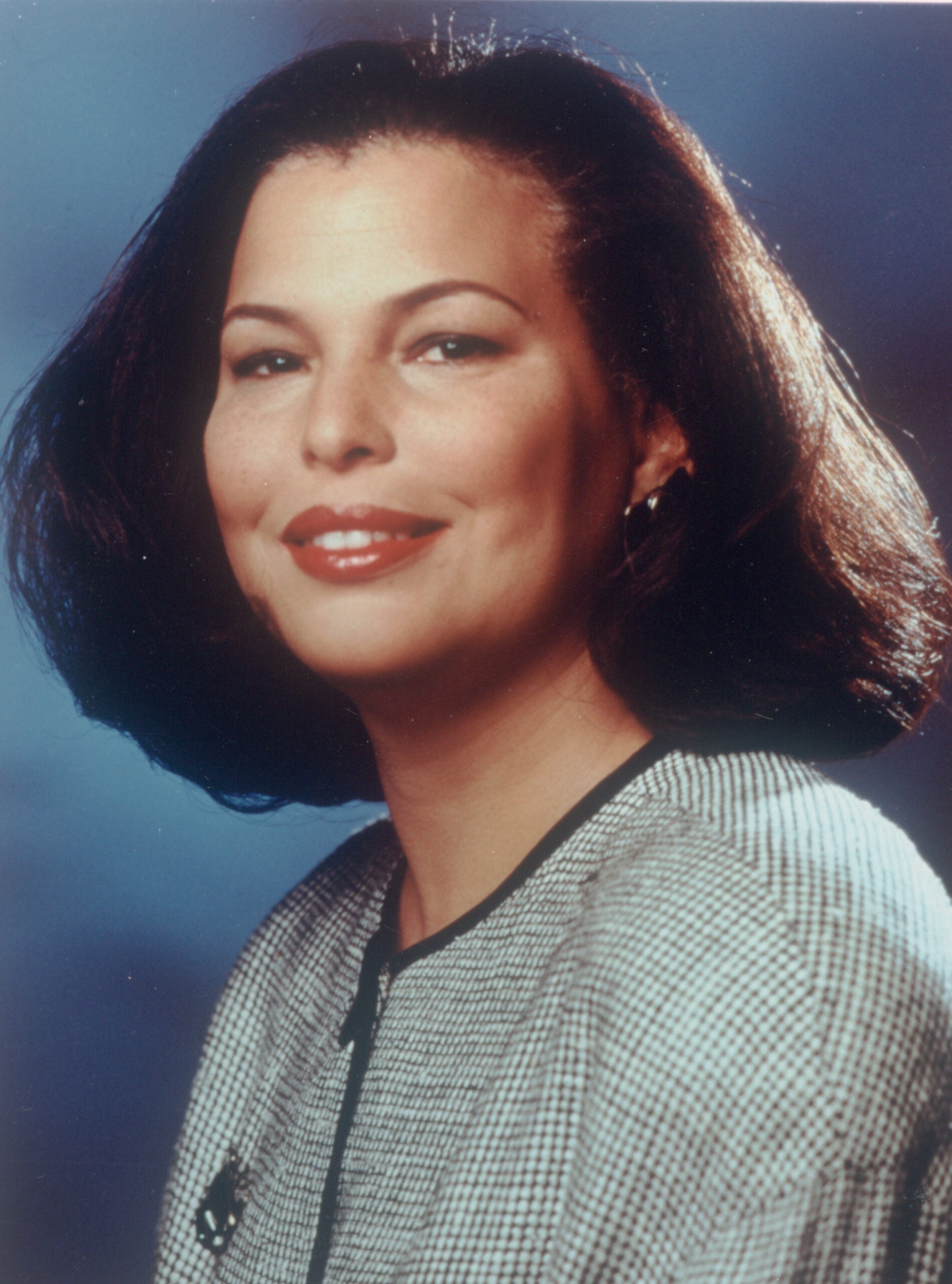
When Trent Lott wanted to speak to Americans–particularly African-Americans–after praising Strom Thurmond’s segregationist run for president, he appeared on Black Entertainment Television. It was a coup for the cable station and for Debra Lee ’80, who has helped make BET the chief outlet for news and entertainment geared to the black community. Currently president and chief operating officer, Lee joined the then fledgling station in 1986 as vice president and general counsel. She has overseen the construction of BET’s new corporate headquarters in Washington, D.C., and the steady ratings growth of a station now available in more than 70 million homes. BET stepped in where network television wouldn’t, Lee has said: The networks still too frequently depict black people as criminals and drug addicts. “We’ve filled a void in the marketplace and increased opportunities on both sides of the camera,” she said in a speech. The recipient of the 2001 Woman of the Year Award from Women in Cable and Telecommunications, Lee wants to ensure that the picture will keep looking better.
* * *
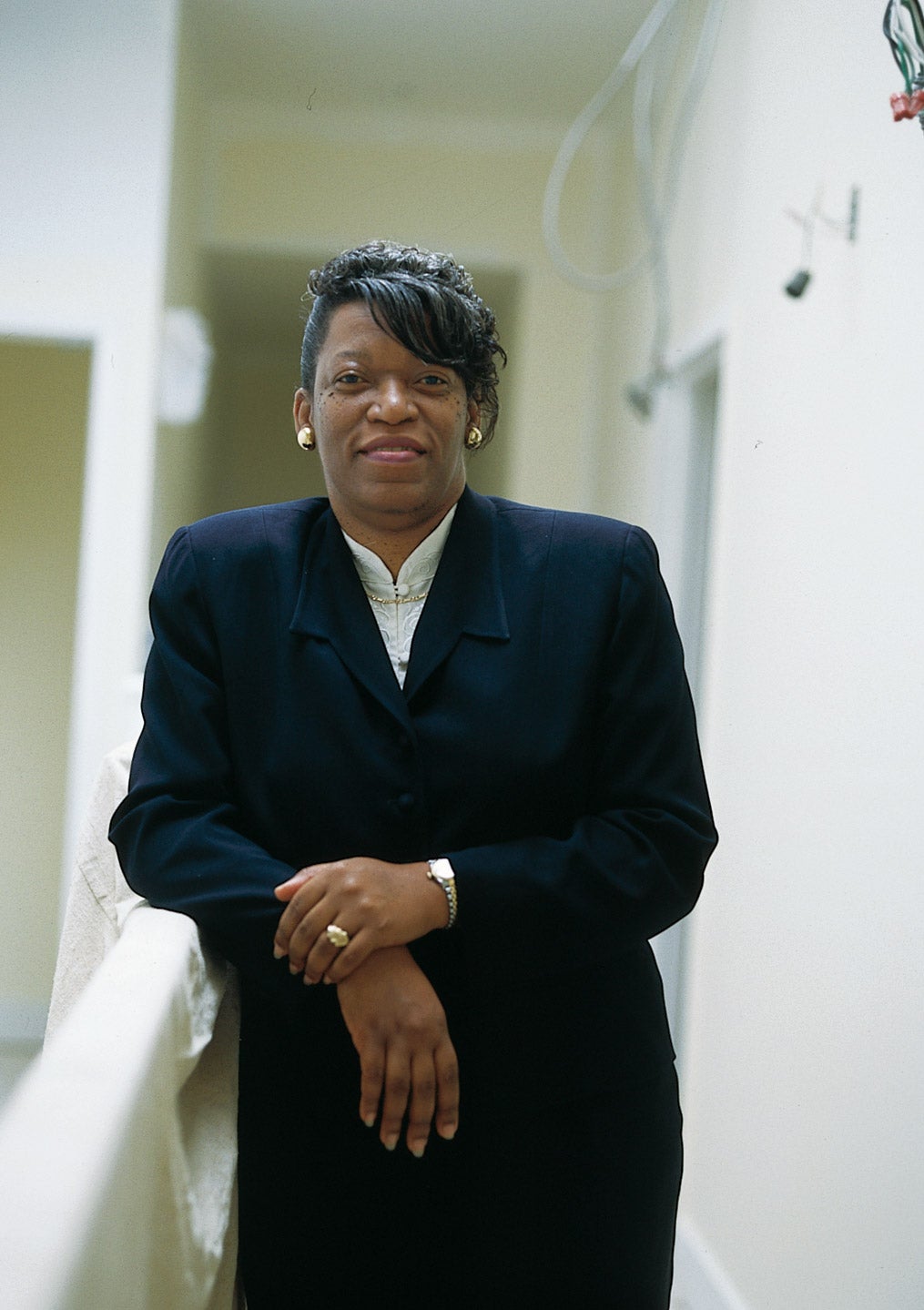
Wilma Lewis ’81 had never been a criminal prosecutor before she took one of the toughest prosecution jobs: U.S. attorney for the District of Columbia, where she led the largest office of its kind in the country and was responsible for both federal and local criminal investigations and convictions. The first woman in that job, she made community outreach a priority and worked to stem drugs and gangs. For her efforts, she won the Founders’ Award from the National Black Prosecutors Association for service to the legal profession. Previously the inspector general for the U.S. Department of the Interior, Lewis served as U.S. attorney until 2001, when she became a partner in the litigation group at Crowell & Moring in D.C. Securing convictions is a prosecutor’s priority, she told the Bulletin in 1999, “but there’s a growing sense among prosecutors that we have a much larger role to play in crime-prevention activities and in contributing to the overall goal of improving the quality of life.” The prosecutor’s responsibilities are always evolving, she said. And so are hers.
* * *
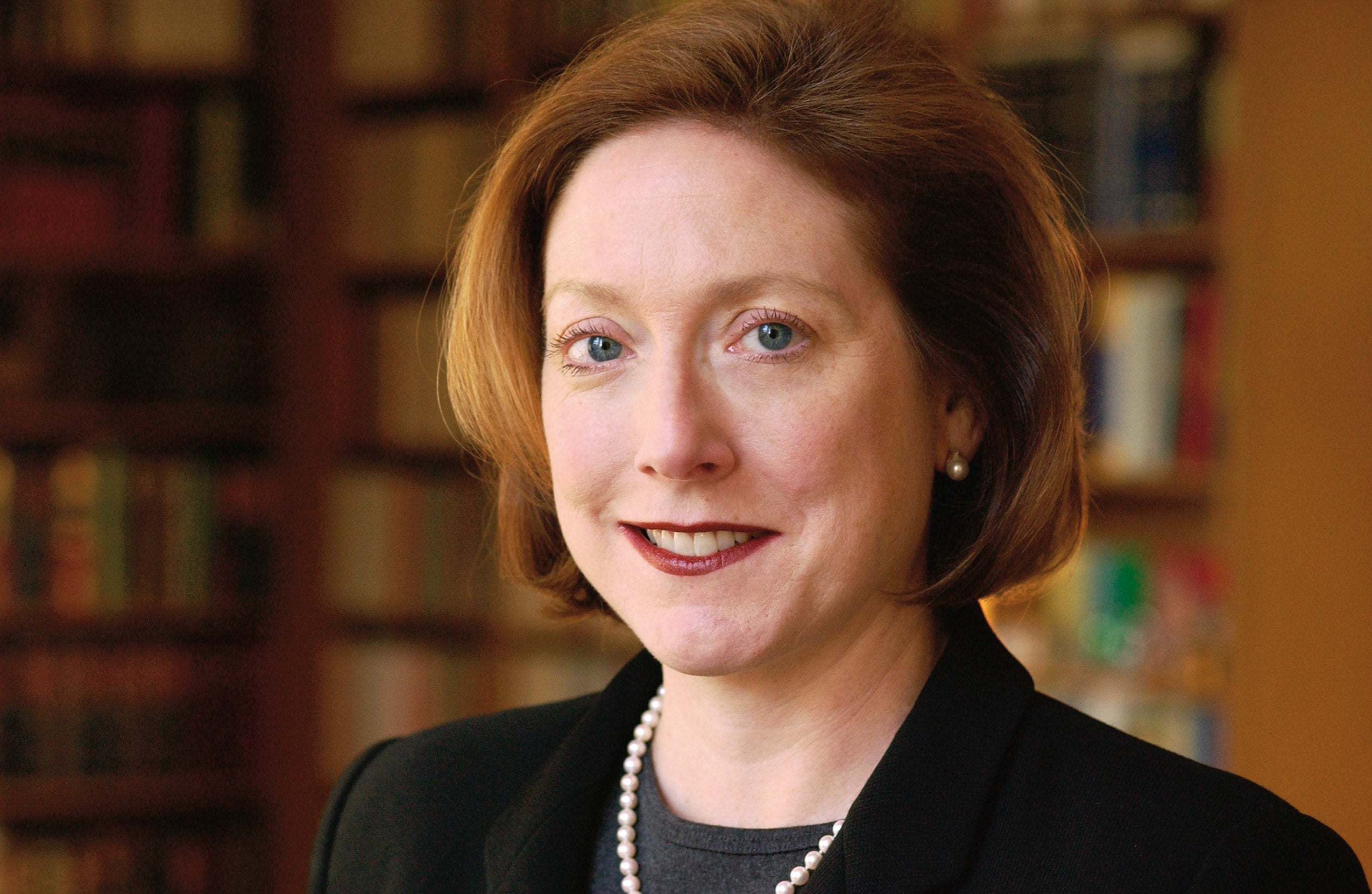
The story goes that when Kathleen Sullivan ’81 was a visiting professor at Stanford Law School, her students wrote a plea on the blackboard before her last class: “Defect to Stanford.” She did, much to the disappointment of Harvard Law students, who had given her the inaugural Sacks-Freund Award for Teaching Excellence. A professor at HLS from 1984 to 1993, Sullivan has stayed on the West Coast since her “defection,” becoming dean of one of HLS’s main competitors in 1999. A constitutional scholar, she teamed with famed Stanford constitutional law Professor Gerald Gunther ’53 to write “Constitutional Law,” and has lectured and written widely on the topic. She has also put her knowledge into practice, including filing an amicus brief with the Supreme Court arguing that President Clinton should not have to defend against a sexual harassment charge while in office. But even in her new role, her enthusiasm and skill as a teacher are still remembered. Gunther, who died last year, said about Sullivan: “She’s certainly the most brilliant analyst and the best teacher in the field, period.”
* * *
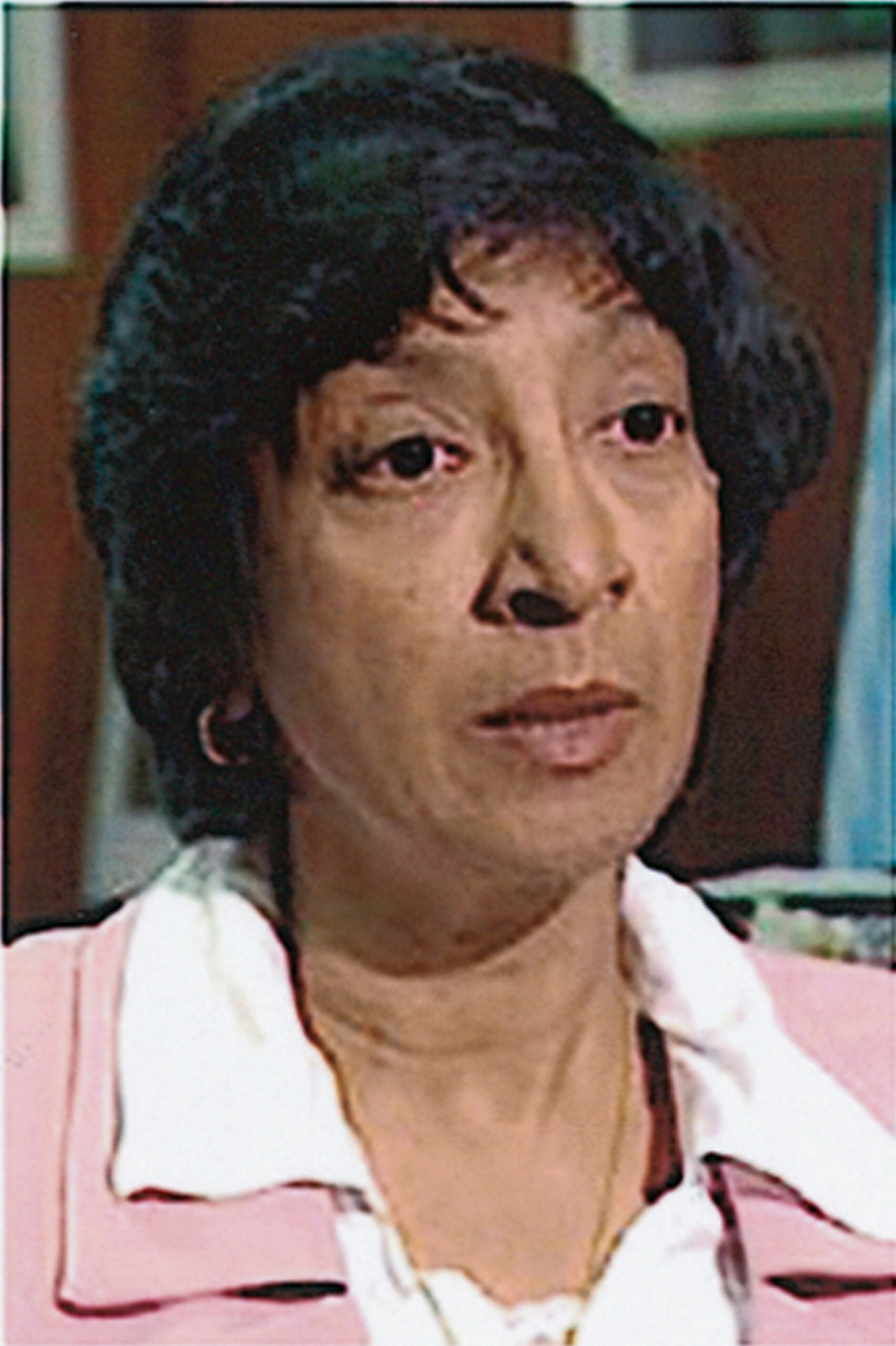
When Navanethem Pillay LL.M. ’82 S.J.D. ’88 began handling her first big trial, her clients called her “girl.” As the trial progressed and she showed her talent as an attorney, they switched to “woman.” It shows, she says, the prejudices but also the opportunities available for women in the law. After all, today she is called “judge.”
One of the 18 judges recently elected to the International Criminal Court, Pillay served as president of the International Criminal Tribunal for Rwanda, presiding over the trials of those accused of committing genocide in Rwanda in 1994. For her work on the tribunal, she was given the 2002 Woman in Law award from the Centre for Human Rights in South Africa, her home country, where she was the first woman of color to be appointed acting judge of the Supreme Court. As an attorney in South Africa, she defended the African National Congress and others fighting apartheid. She also has fought injustice against women and advocates for greater participation internationally for women in the law to redress the wrongs she has seen all too many of.
* * *
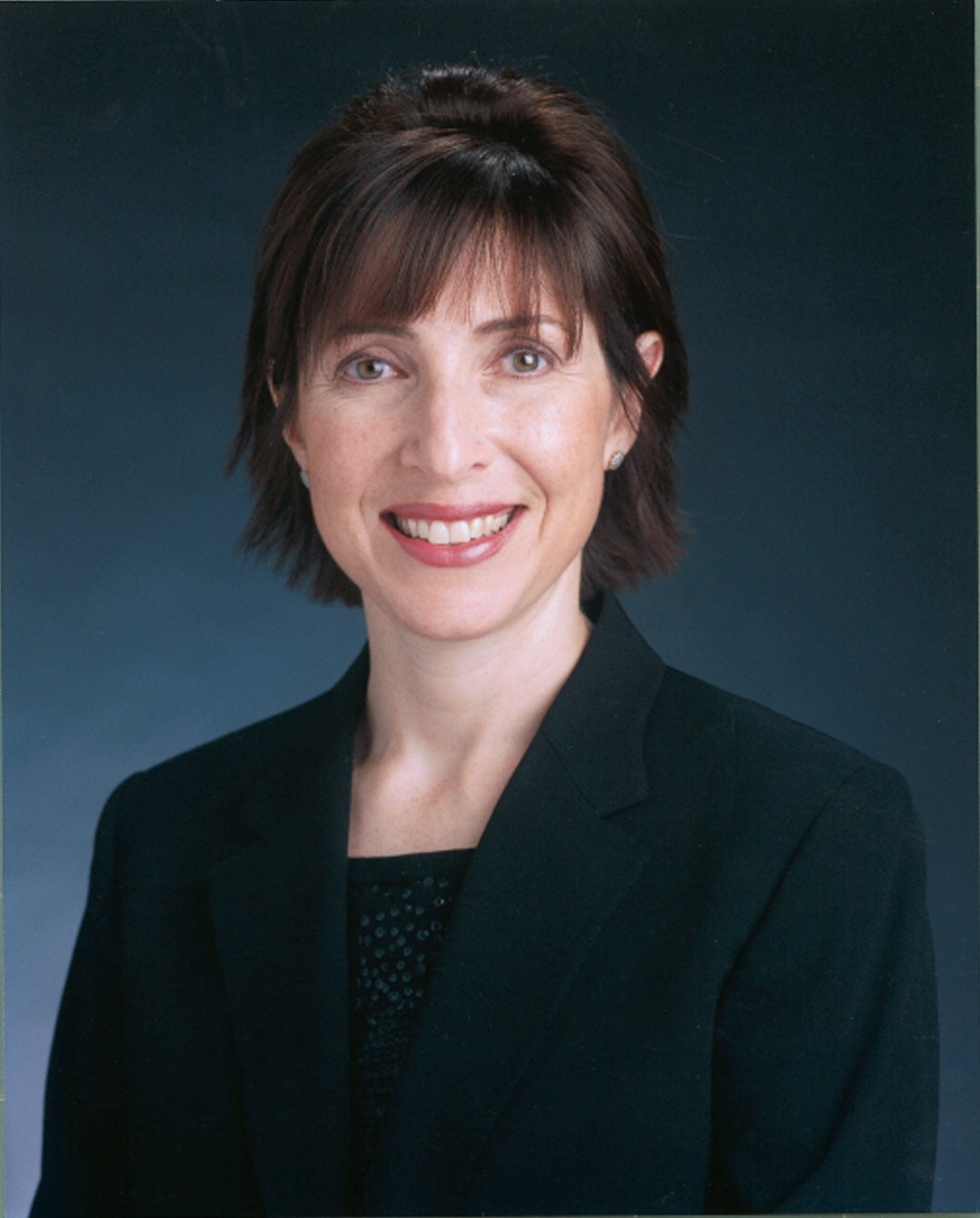
Nancy Josephson Sanitsky ’82 began her career in law. But she ended up in a place she was born to star in.
The co-president of International Creative Management in Beverly Hills, Calif., Sanitsky became the first female president of a major talent agency in 1998. Her father, Marvin Josephson, founded ICM in 1955, and she began working there after a stint in an entertainment law boutique in New York City. That is where, in classic talent agent fashion, she discovered unknown playwrights who would be among television’s hottest properties. The playwrights later went on to develop the NBC hit “Friends,” which is signed through its ninth season.
Sanitsky, who previously was the company’s executive vice president in charge of television, oversees one of the industry’s top three agencies, which represents actors and directors as well as talent in theater, music, publishing and new media. The roster includes the creator of the “Dilbert” comic strip, about a dysfunctional and depressing workplace–an environment she has steadfastly avoided. As she told the Bulletin in a 1998 interview, “Mine is a ridiculously fun job.”
* * *
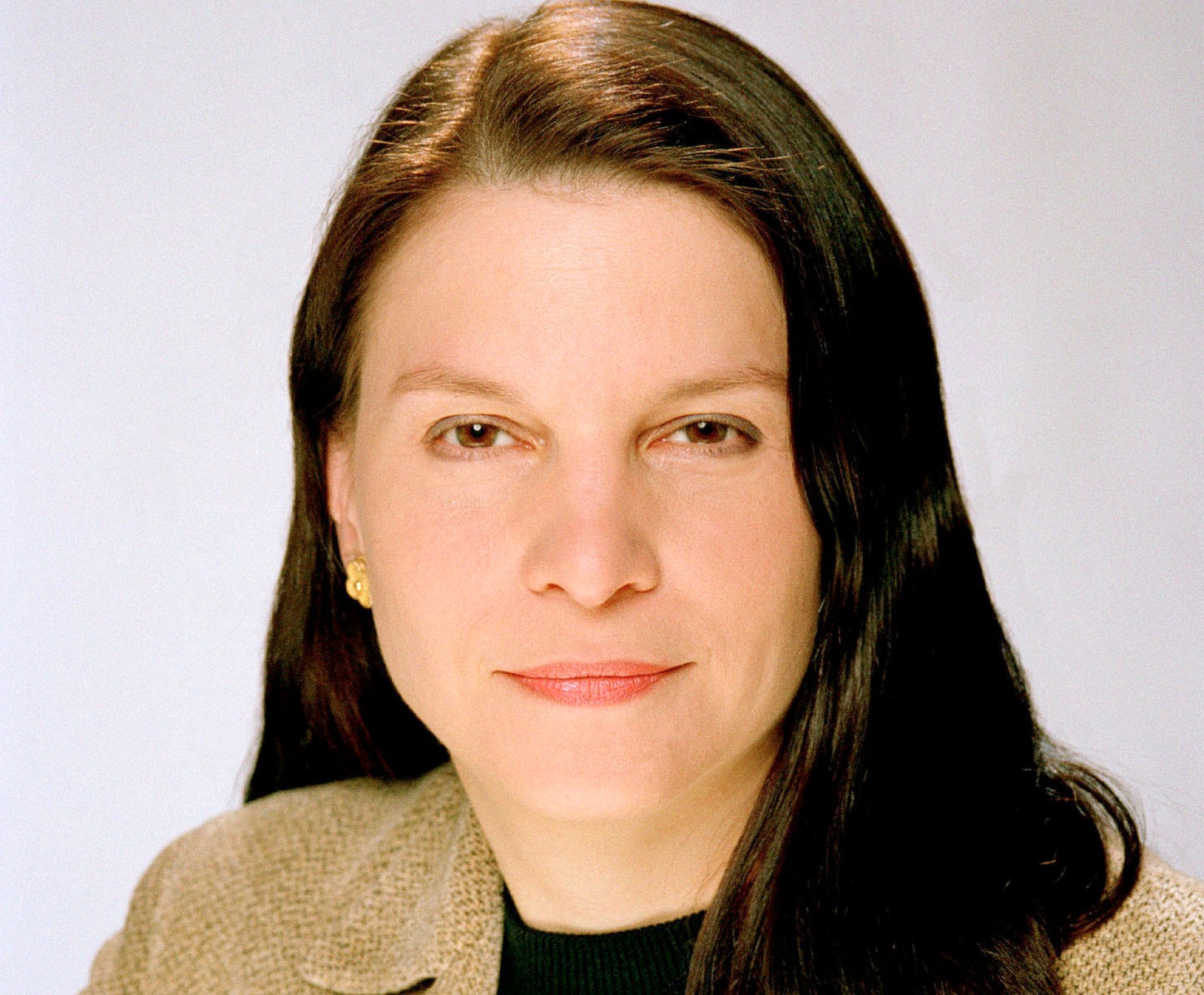
A lawyer who could defend both Lt. Col. Oliver North and President Bill Clinton has to be tough. As North himself told The Washington Post: “Nobody messes with Nicole Seligman.”
Seligman ’83 first grabbed public attention not long after graduating from HLS, when she was part of the legal team representing North in the Iran-Contra trial. A former clerk for Supreme Court Justice Thurgood Marshall, she also defended Clinton in impeachment proceedings when she was a partner at Williams & Connolly, saying on the Senate floor: “The moment has arrived where the best interest of the nation, the wise prescription of the framers and the failure of the managers’ proof all point to dismissal.”
Today, Seligman is executive vice president and general counsel of Sony Corporation of America, overseeing all legal, intellectual property, investor relations, government, regulatory and general affairs for the company. She came to Sony after having represented media interests like CNN, ABC and even occasionally The National Enquirer, showing again that all kinds of clients want her in their corner.
* * *
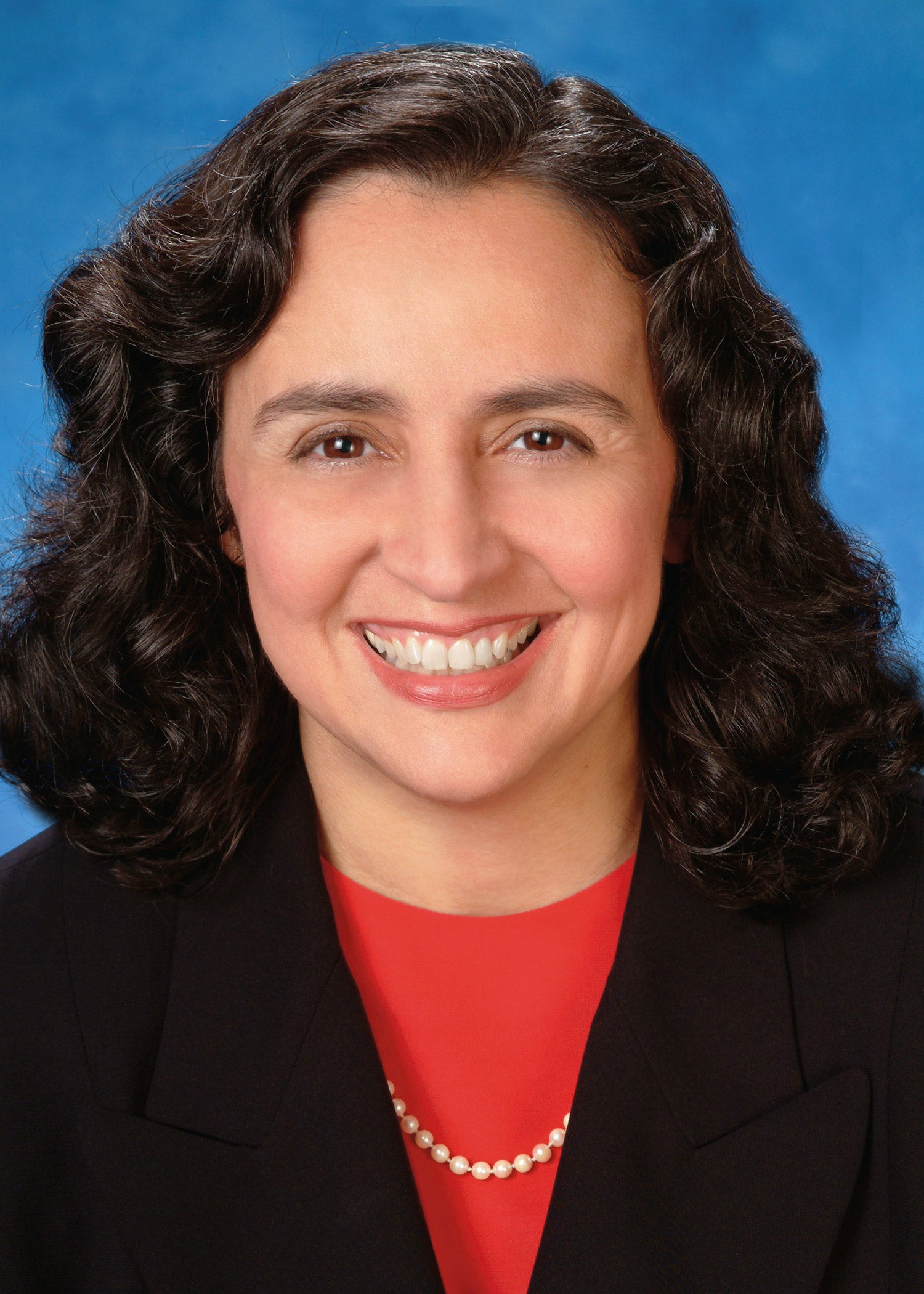
It was a “Perry Mason” moment for Dale Cendali ’84 Shortly before she made partner at O’Melveny & Myers in New York City, she defended the right of a TV program to show footage of O.J. Simpson and Nicole Brown’s wedding. Simpson tried to stop it on privacy grounds until, in televised court proceedings, Cendali noted passages from his own book that described the wedding. The case was dismissed.
Cendali has had many moments in the spotlight since then. Named by the National Law Journal as one of America’s top 50 women litigators, she represented the winning side in a dispute over the ownership of choreographer Martha Graham’s work, successfully defended the E. & J. Gallo Winery on false advertising charges and stopped the unauthorized sale of necklaces copied from the movie “Titanic.” Recently, she argued a case before the Supreme Court alleging a trademark violation in the production of a World War II documentary.
Now chairwoman of her firm’s copyright, trademark and Internet litigation practice group, Cendali writes and lectures frequently on those topics. After all, other lawyers may want to copy what she does.
* * *
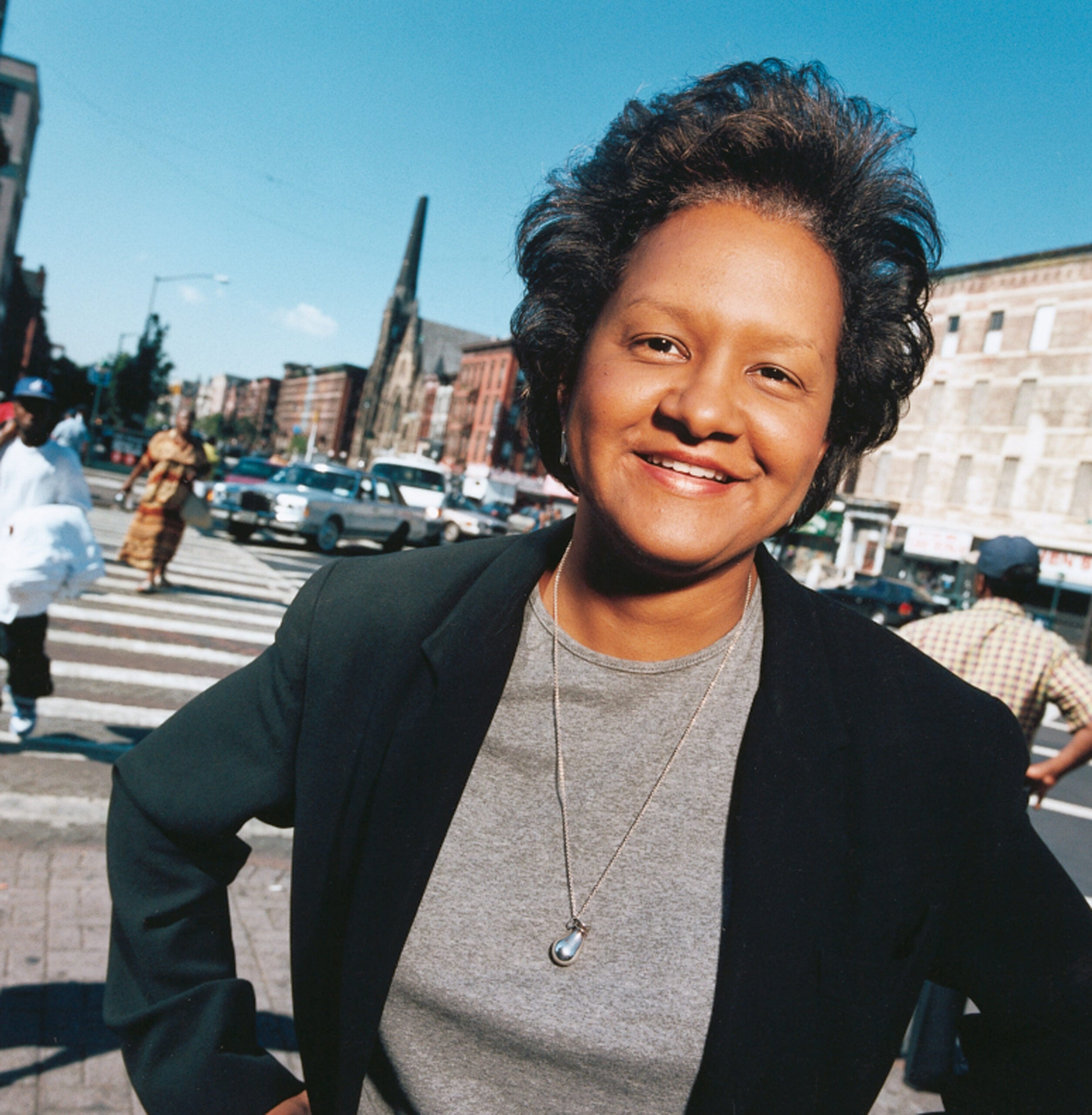
Deborah Wright ’84 knows the value of empowerment. Appointed president and CEO of Carver Bancorp Inc. in 1999, Wright is today in charge of the nation’s largest African-American-operated bank, with assets of $420 million and 120 employees. The once-struggling institution, based in Harlem with branches throughout New York City, achieved its highest level of profitability in company history last year and has shown steadily higher stock prices since her arrival.
It’s part of a career in which Wright has worked to bring financial power to an underserved community. She previously was president and CEO of the Upper Manhattan Empowerment Zone Development Corp. and commissioner of the Department of Housing Preservation and Development in New York City. The daughter of a minister, Wright preaches the importance of bringing financial services to a minority community once ignored by most banks. “The irony is, this tiny institution, whose market was generated by discrimination, now finds itself competing with the very folks who wouldn’t give services or set foot in New York’s minority communities,” she told the Bulletin in 1999. If her company wins the competition, people in the inner city will win too.
* * *
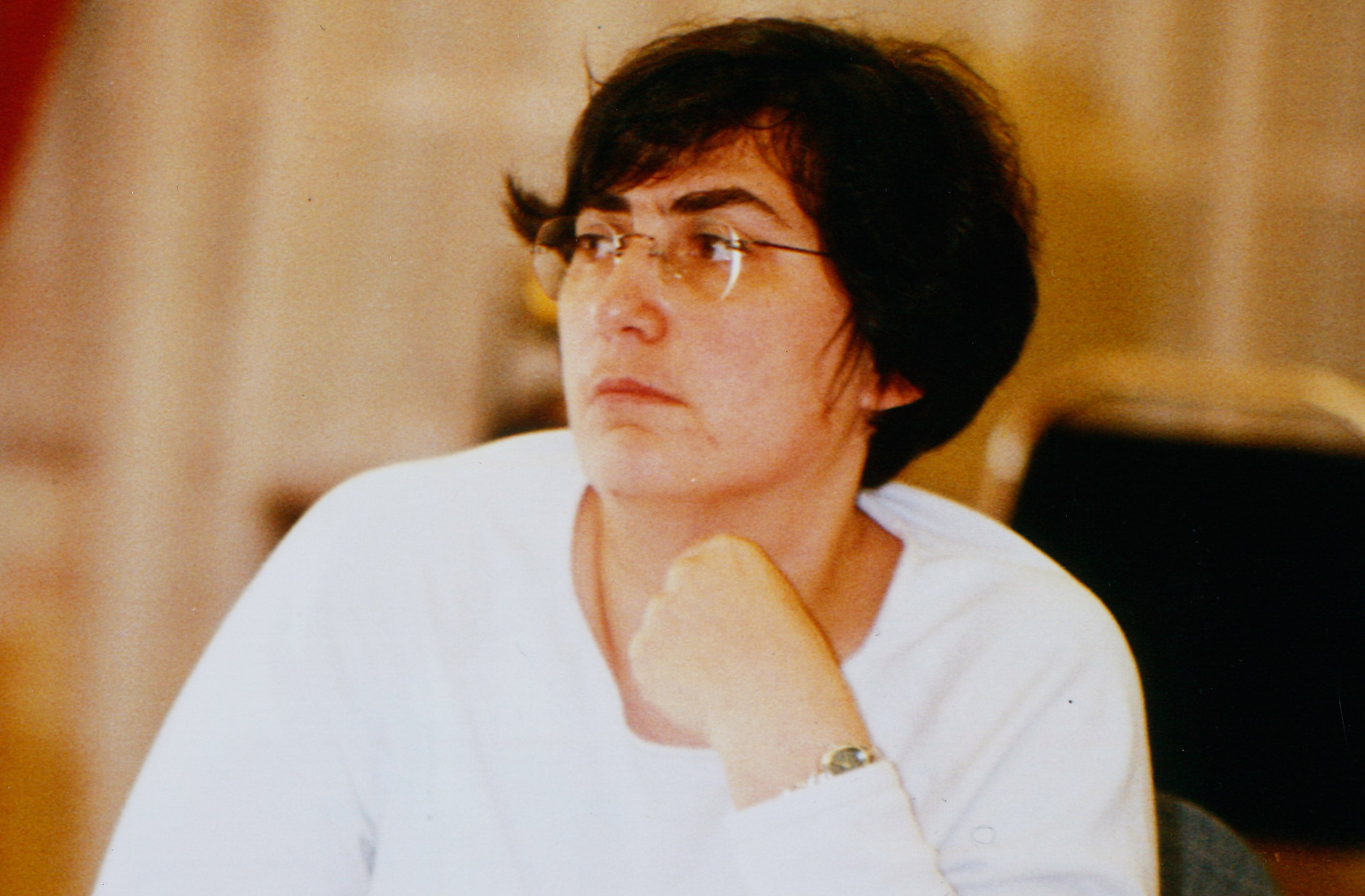
In 1991, hundreds of boys attacked a girls dorm at a school in Kenya, raping 71 teenage girls. Nineteen girls were trampled to death trying to escape. “The boys never meant any harm against the girls,” said the school’s vice principal. “They just wanted to rape.”
Shortly thereafter, Jessica Neuwirth ’85 helped start Equality Now in response to such violence against women that is excused and even encouraged the world over. Initially focused on the rape of Bosnian women as a weapon of war, the New York City-based organization (whose founders also include Navanethem Pillay LL.M. ’82 S.J.D. ’88) has also lobbied governments and helped enact legislation against female genital mutilation, sex trafficking and domestic violence.
The president of the organization, Neuwirth previously worked for Cleary Gottlieb Steen & Hamilton and Amnesty International, where she honed her talents for bringing public attention to often overlooked human rights abuses. At Equality Now’s 10th anniversary celebration, Meryl Streep, one of its many celebrity supporters, called Neuwirth a “shy, elusive heroine”–not a celebrity, but someone to celebrate.
* * *
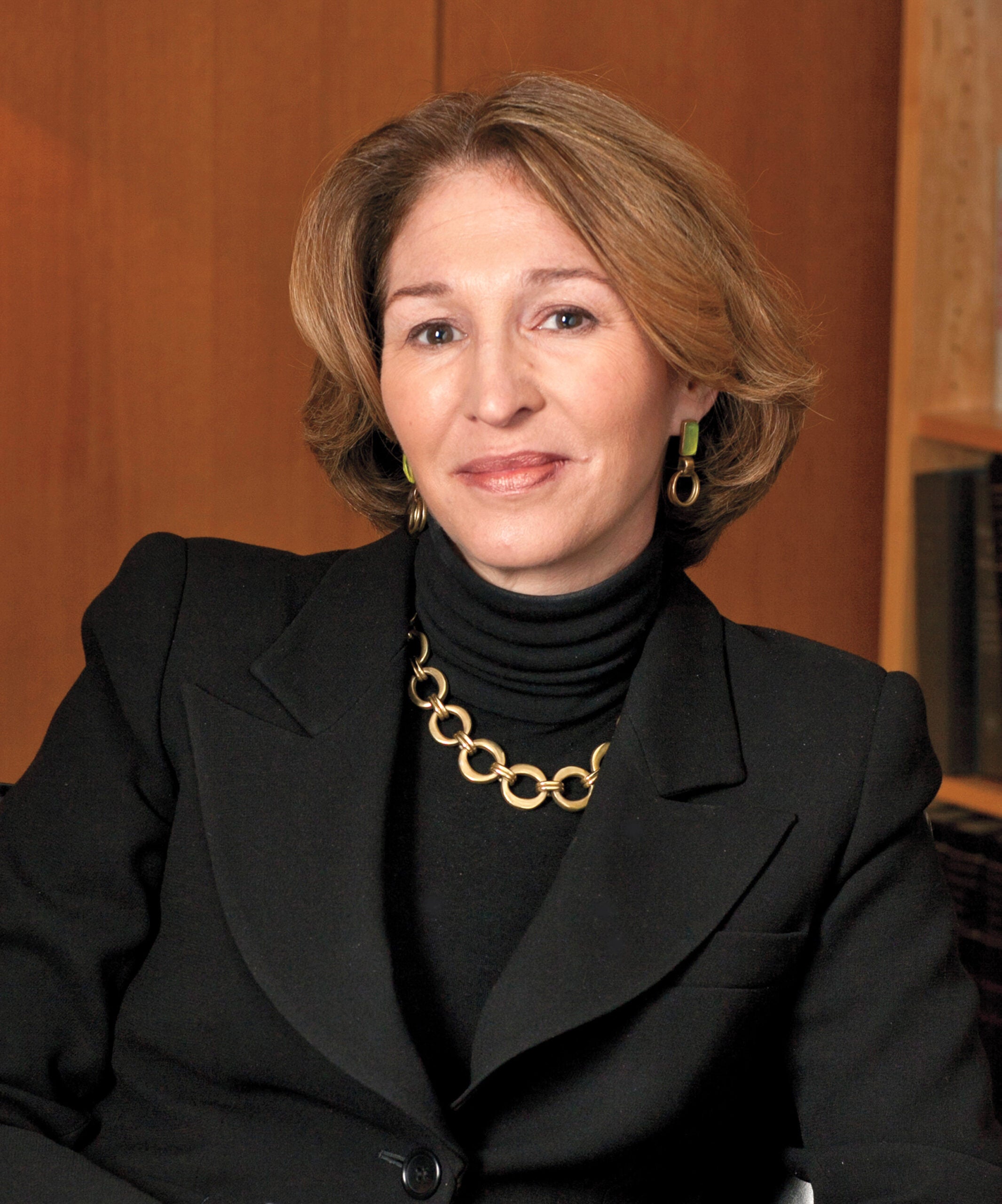
No one in academia has done more to put international issues on the map than Anne-Marie Slaughter ’85. And in the post-Sept. 11 environment, more and more people from outside the world of academia are turning to her ideas about the world of law. Appointed dean of the Woodrow Wilson School of Public and International Affairs at Princeton University last year, Slaughter has written more than 50 articles, has edited or written four books and is a frequent media contributor on topics such as international courts and tribunals, the legal aspect of the war on terrorism and building democracies around the world. She built her expertise as director of the Graduate and International Legal Studies Program at HLS, where she taught for eight years before returning to her undergraduate alma mater. A member of the Council on Foreign Relations, she cites the opportunity to devise common procedures among nations around the world–not just in the West–in the aftermath of Sept. 11. “Justice is on our side,” she wrote. “We should not forsake it.”
* * *
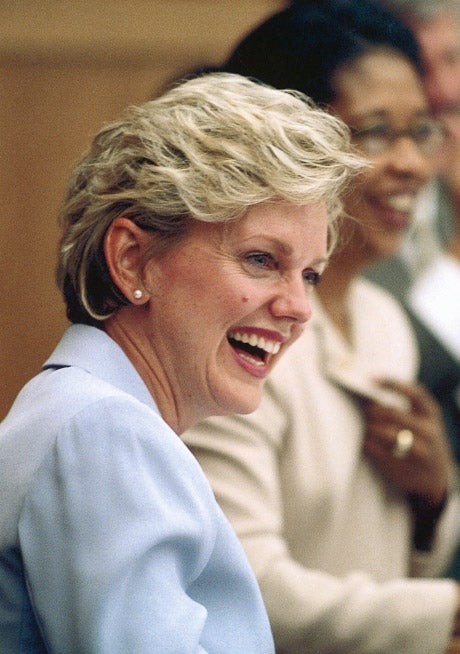
In a group known for its pioneers, Jennifer Granholm ’87 has achieved a significant “first.” She is the first HLS alumna to be elected governor of a state, sworn in as chief executive of Michigan earlier this year (she’s also the first female governor of the state). Not bad for a woman who first gained elective office when she won the state attorney general’s post in 1998.
In that position, she emphasized bread-and-butter issues of child and consumer protection and ran for governor as a social progressive who is fiscally responsible. She’ll have to be, as a governor who must tackle a state budget shortfall. But few underestimate her now, since she won the election displaying a combination of policy know-how and charisma, defeating two veteran politicians in the state primary and the lieutenant governor in the general election. In an interview with the Bulletin during the campaign, she spoke about how the face of leadership doesn’t always have to look the same. It can look a lot like hers.
* * *
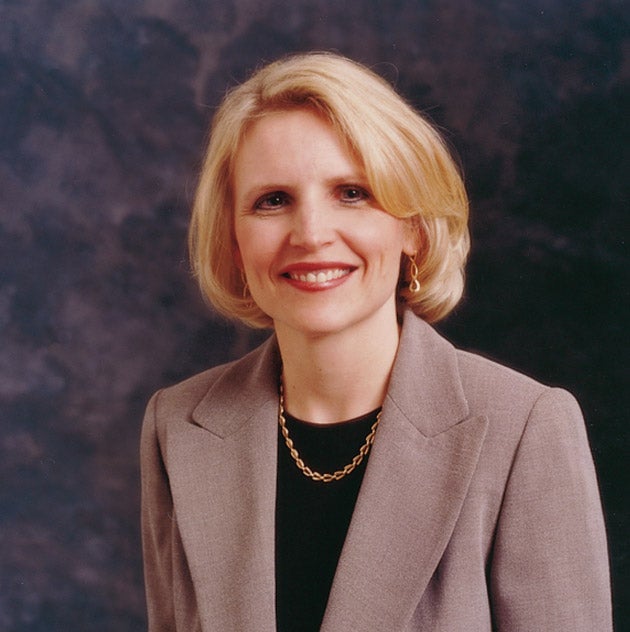
Anticipation. It’s the slogan that Heinz, the world’s largest ketchup manufacturer, is famous for. But it also could describe the slow progress of women achieving positions of power and influence in America’s Fortune 500 companies.
At Heinz, the wait is over. In 2000, Laura Stein ’87 became senior vice president and general counsel of the Pittsburgh-based food conglomerate. Supervising a legal department of about 30 attorneys worldwide, she is responsible for the company’s global legal, compliance and corporate secretary matters. Stein, who speaks several languages and has lived in China and Italy, relishes the international nature of the company, which has global sales of nearly $10 billion. She also helps the business flow. Last year, for example, she assisted in the major acquisition of Del Monte in a $2.8 billion multipart deal.
Committed to pro bono work and community service, Stein serves as chairwoman of the ABA’s Commission on Domestic Violence. And as president of Heinz’s Global Organization for the Advancement of Leadership for Women, Stein is working to shorten the wait for women who want to achieve the kind of career success she has enjoyed.
* * *
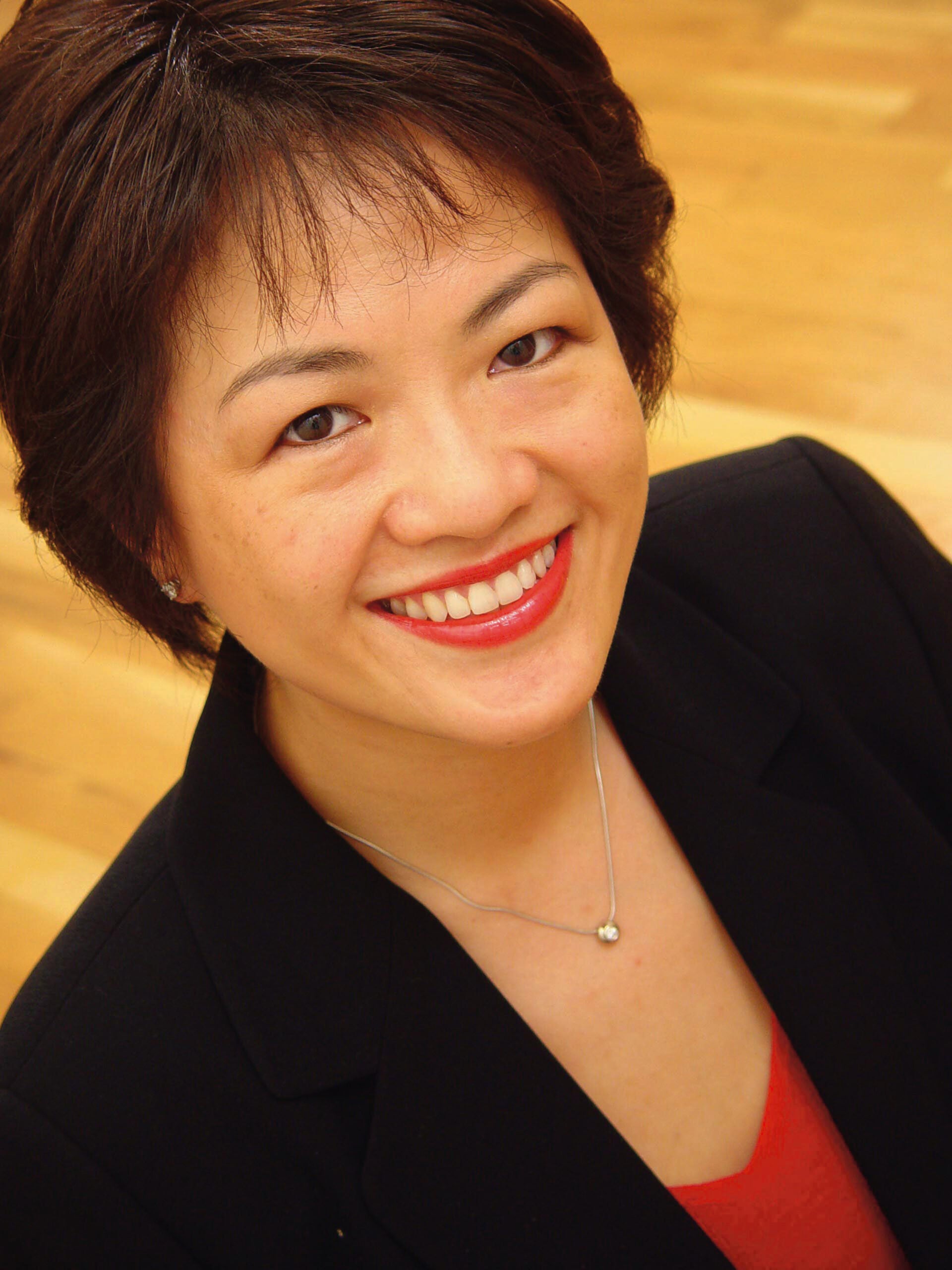
Time magazine gave Peggy Kuo ’88 a superhero’s moniker when it dubbed her “The War-Crimes Fighter.” But the former prosecutor at the International Criminal Tribunal for the former Yugoslavia was down-to-earth in an interview with the publication. “I knew I would be playing a part in history just by being here, because it’s the first war-crimes tribunal since Nuremberg,” she said. “I just got lucky.”
Kuo has made her own luck in a career marked by advocating for those who are victimized and by punishing the victimizers. After a stint as an assistant U.S. attorney in the District of Columbia, she joined the criminal section of the civil rights division of the U.S. Department of Justice, where she investigated and prosecuted violations of civil rights, and for which she later served as acting deputy chief. At the U.N. tribunal, she prosecuted the case for genocide against Slobodan Milosevic and, for the first time in history, successfully argued that rape is a crime against humanity, in a case involving Muslim women who were treated as sex slaves during the Bosnian war.
Today, she practices in the litigation section of Wilmer, Cutler & Pickering in New York City. The firm is lucky to have her.
* * *
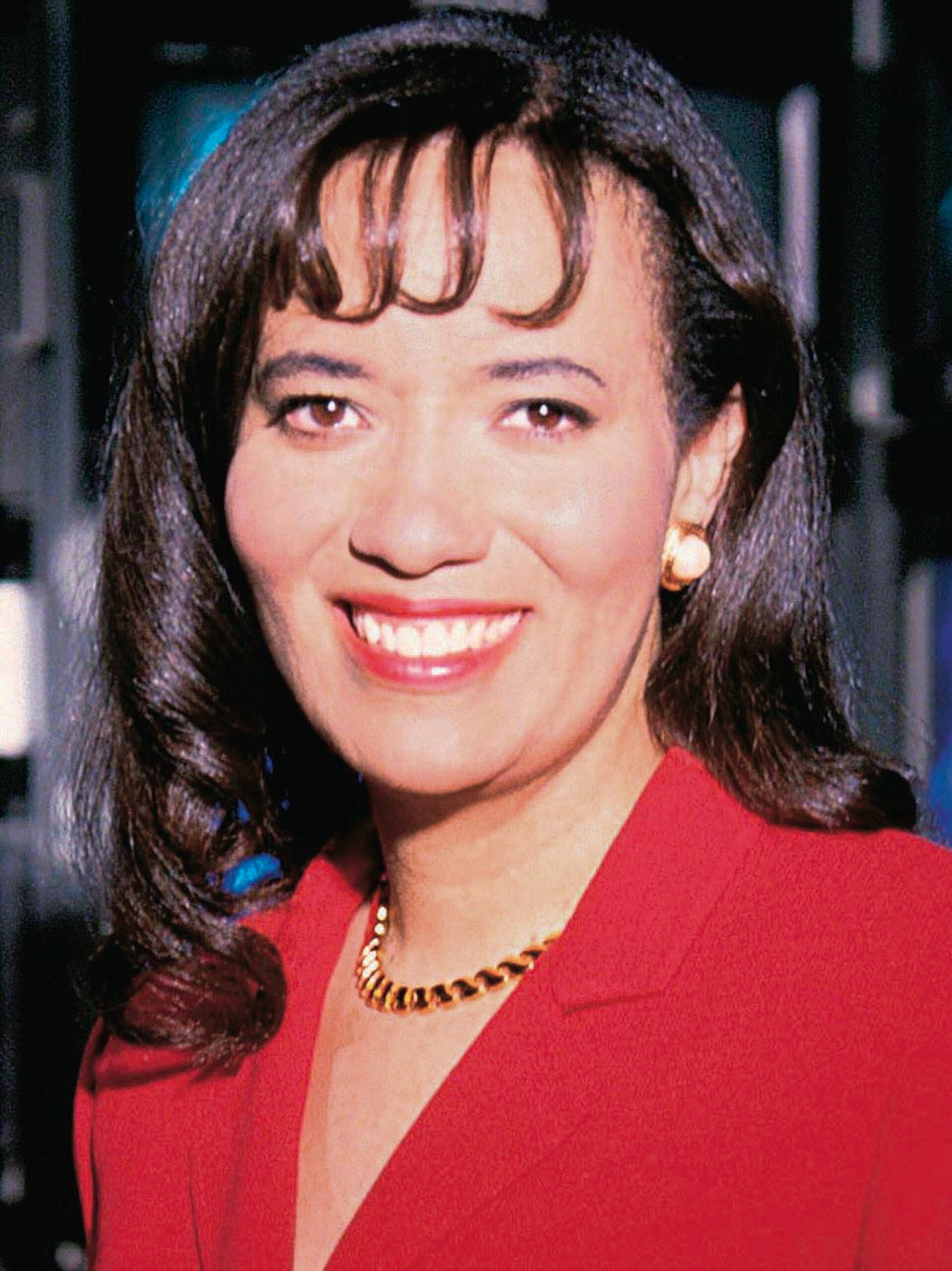
If you want business and stock market information on TV, there is only one place to turn: CNBC, and, by extension, Pamela Thomas-Graham ’88 (’89). Named president and CEO of the network in 2001, Thomas-Graham is responsible for CNBC’s domestic operations, including programming and advertising sales. She came to the network after a 10-year stint at McKinsey & Co., the management consultant giant, where she was the first black female partner. She has called the business world “the next stage of the civil rights movement,” a means to bring opportunity to the black community and transform society. The executive, who has been profiled in Fortune and Time magazines, also manages to find time to write the “Ivy League Mystery” series. She doesn’t have many role models for what she has done, but that hasn’t stopped her yet. “The lesson I learned is that you have to be very determined and resilient; you can’t let yourself be discouraged or take no for an answer,” Thomas-Graham once wrote. “Sometimes you have to be your own role model.”
* * *
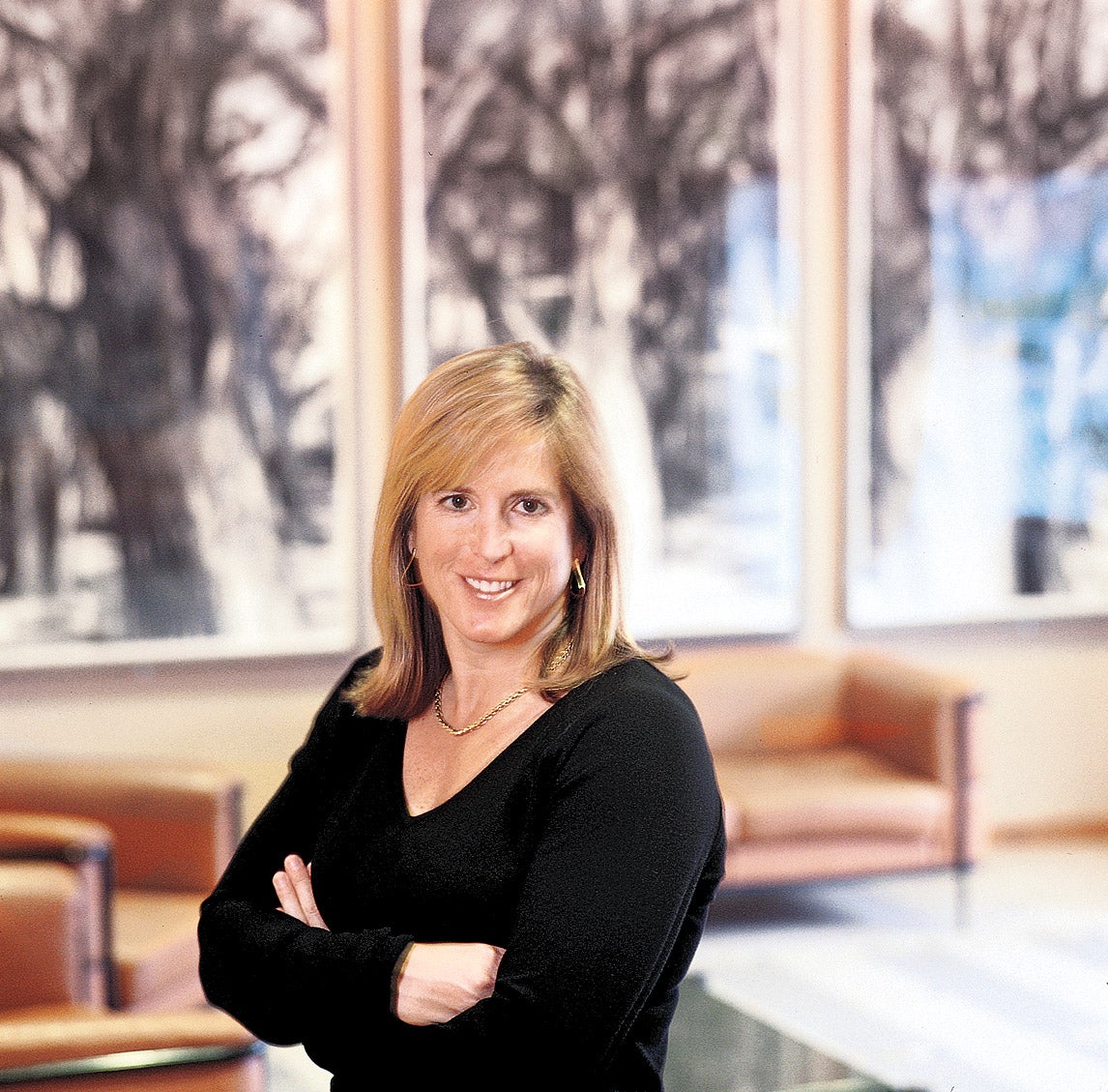
Joy Covey ’89 (’90) has always done things differently. She dropped out of high school. She rode to her own wedding on a snowmobile. And she defied the conventional thinking of the business world by stating that, for the company whose finances she oversaw, short-term profits weren’t the priority.
“A lot of things we did were things that hadn’t been done before, or situations that had never been dealt with,” Covey said in a Bulletin interview last year. “We spent a lot of time thinking unconventionally. . . .”
Doing things differently worked out just fine. Covey arrived at a fledgling company called Amazon.com in 1996 and, as chief financial officer, helped build the company into the world’s leading Internet retailer. Also serving as vice president of finance and administration, she helped raise $1.7 billion for Amazon.com, and emphasized its long-term value for customers. For her efforts, she was named one of the 50 most powerful businesswomen in America by Fortune magazine in 1999. Covey left the company in April 2000 to do her own thing, which will no doubt work out just fine too.
* * *
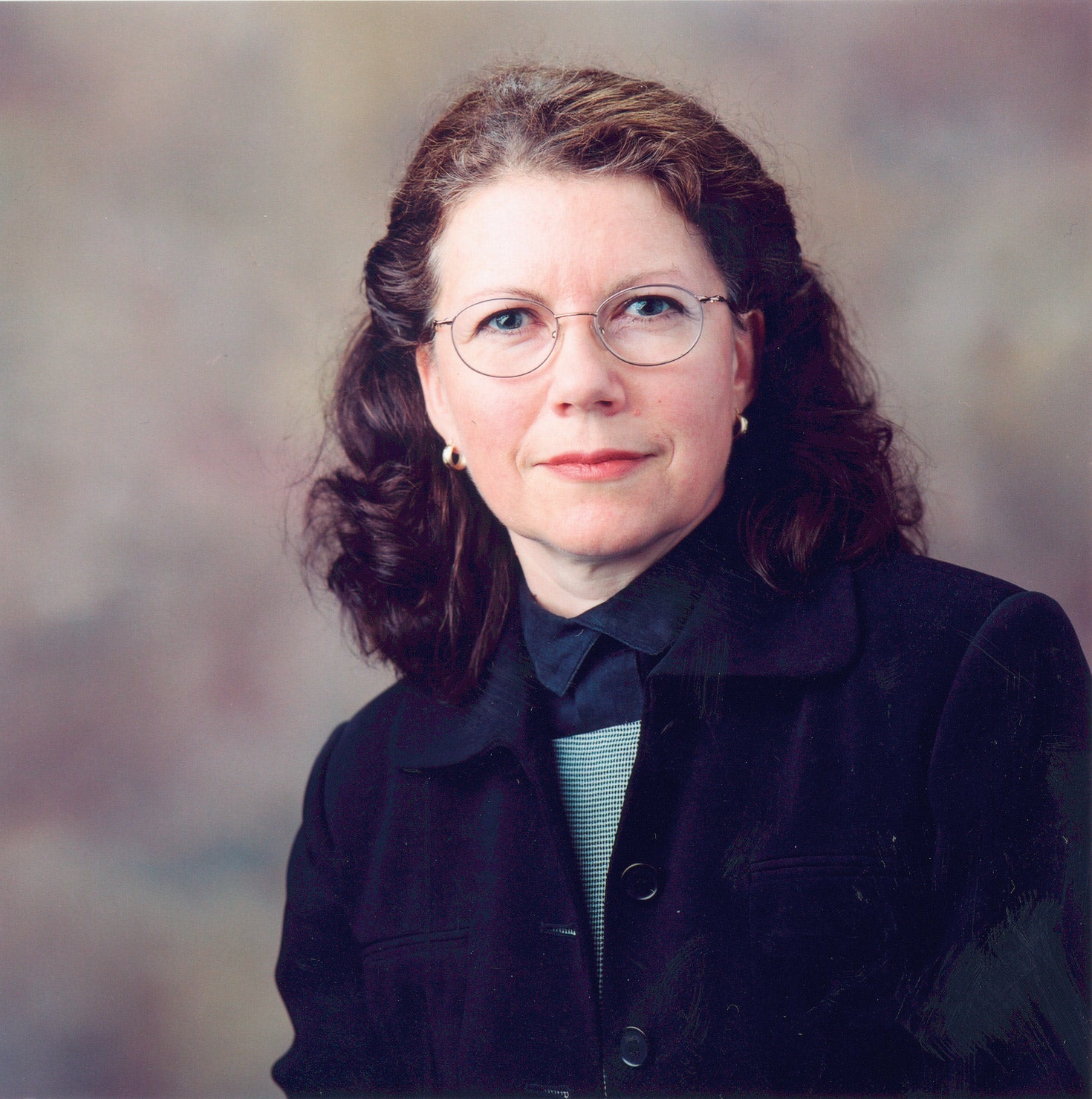
Sarah Buel ’90 has won many awards, including the inaugural Gary Bellow Public Service Award at HLS, and has even been featured on national television as one of the five most inspiring women in America. But she is most proud of her son, who runs a teen dating violence intervention program. His work is the embodiment of her faith that domestic violence can be eradicated, a goal that she has spent 25 years trying to achieve.
A survivor of domestic abuse, Buel was a welfare recipient before going to Harvard University Extension School at night for seven years to obtain her undergraduate degree. While at HLS, she founded the Battered Women’s Advocacy Project, and she later helped establish the domestic violence unit of the Norfolk County, Mass., District Attorney’s Office, which became a national model for outreach to abuse victims. Today, she is a clinical professor at the University of Texas School of Law, where she started and co-directs its domestic violence clinic. Buel narrated the Academy Award-winning documentary “Defending Our Lives” and has been a leading voice to address an injustice that once was not spoken about.
* * *
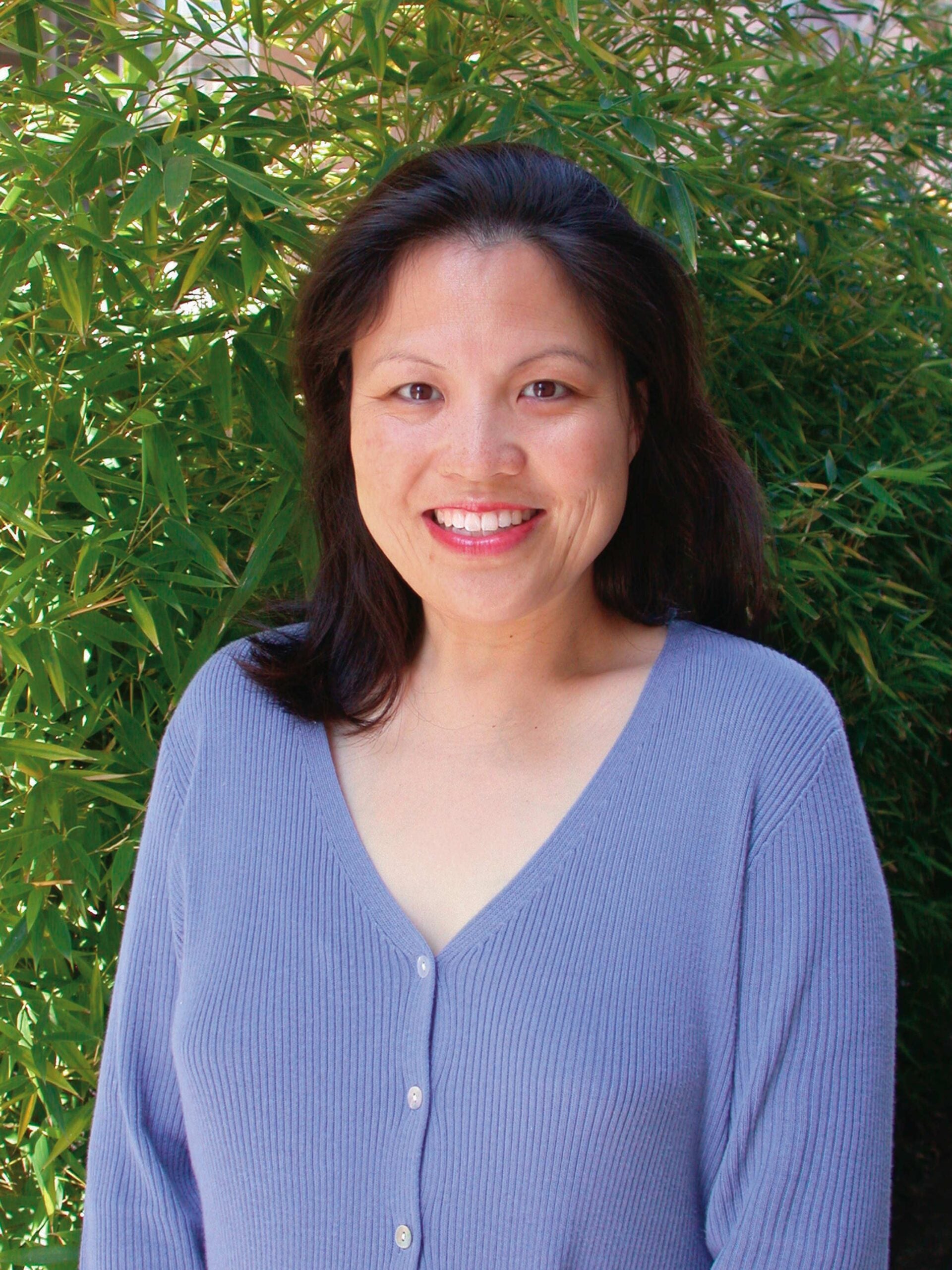
Julie Su ’94 got nationwide attention when she represented dozens of Thai garment workers in 1995, after they had been held in virtual prison conditions in an El Monte, Calif., sweatshop. But the spotlight should not be on her, she said. “The story of these immigrant workers–how they came here with their dreams of America, how they were enslaved . . . that’s the story that needs to be told,” she told the Los Angeles Times.
As litigation director of the Asian Pacific American Legal Center of Southern California, Su recovered damages for the workers in the El Monte case and helped them gain legal immigrant status. A co-founder of Sweatshop Watch, which addresses labor issues in the garment industry, she has won a Reebok International Human Rights Award and a MacArthur Foundation “genius grant.” She cites her Chinese immigrant parents as inspiration for her work. “I looked at the workers–so many of them women about my age–and I knew the only difference between me and them came from the pure chance of having been born in a different place with different opportunities,” Su said.
* * *
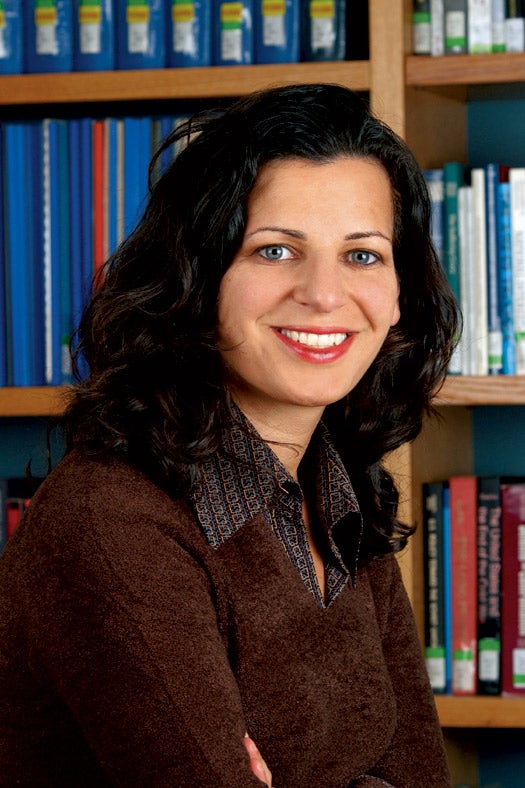
As a young, Lebanese-American woman, Juliette Kayyem ’95 doesn’t fit the profile of an expert on counterterrorism. But, as she notes, profiling can be insidious. That includes questioning and detaining members of the Arab and Muslim communities in the name of security or assuming someone like her can’t speak with authority on the issue.
Currently executive director of the Executive Session on Domestic Preparedness at the John F. Kennedy School of Government, Kayyem has frequently voiced concern since Sept. 11 over purchasing “security at the expense of civil liberties.” Appearing as a terrorism expert for several news organizations and writing opinion pieces for major newspapers, she has called for more focus on Al Qaeda and less on “press conferences where every investigatory move is shared and heralded.”
“Juliette is a sophisticated observer of how bad terrorism can be,” said former CIA Director R. James Woolsey in The Boston Globe, “but she sees the need for a balance, and she tips in the civil liberties direction.” For the former legal adviser to Attorney General Janet Reno ’63 and counsel to the assistant attorney general for civil rights, the best recourse, she writes, is “good old-fashioned lawyering.”
* * *
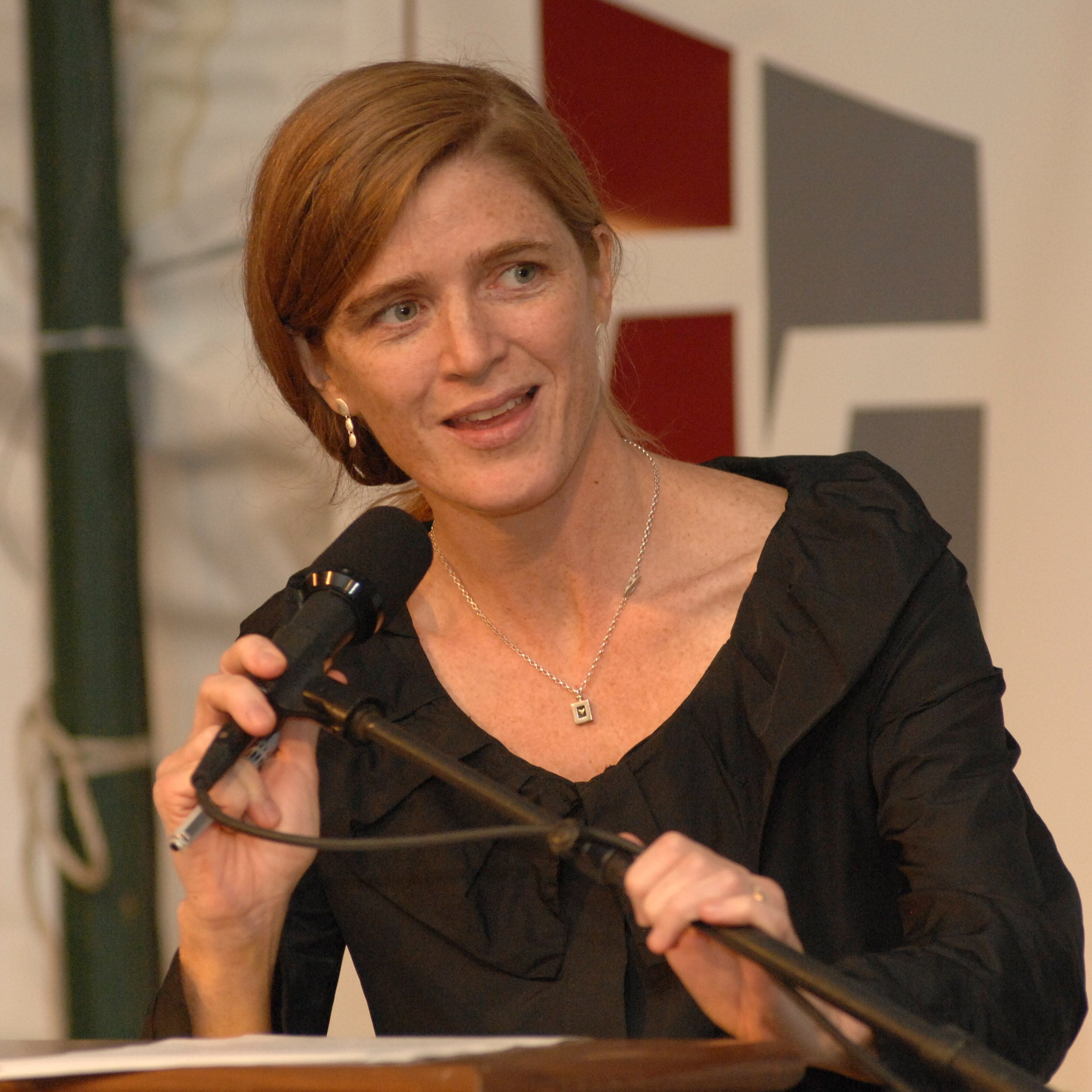
It is not about genocide. Samantha Power ’99 is quick to note this about her book, “A Problem from Hell: America and the Age of Genocide.” It is about America’s response–or lack of response–to atrocities around the world during the 20th century. The book stems from her experience as a war correspondent in Bosnia and reflects years of research and hundreds of interviews. The work has garnered critical praise–winning this year’s Pulitzer Prize for general nonfiction and the 2002 National Book Critics Circle award–and worldwide attention for the lecturer in public policy and founding director of the Carr Center for Human Rights Policy at the John F. Kennedy School of Government. Many books have focused on genocide but not on the choice to be a bystander. At the same time, she praises people who “stand up when the herd stands by.” People like Raphael Lemkin, a Holocaust survivor who coined the term “genocide” and drafted the Genocide Convention, the first U.N. human rights treaty. People like William Proxmire, the U.S. senator who fought for years to have the United States pass the convention. Power stands with them.
